#well this is a very long post with an analysis of each character's costumes
Text
since edwin is very closed off, except for when he’s with his best friend, charles, costume designer kelli dunsmore reflected his buttoned-up mentality through his bespoke suit, complete with bowtie and collar. edwin’s outfit, along with charles’ period garb, were designed to help them stand out more in modern day port townsend. “i knew edwin would, because no one dresses like that now,” says dunsmore.
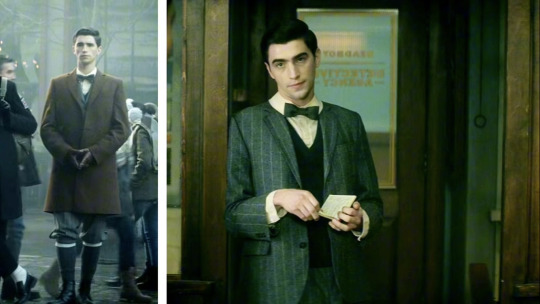
dunsmore wanted everything about charles to feel “a little bit cool and underground,” from his union jack and the who bull’s-eye patches to his checkerboard pins. his little cross earring and chain on the outside of his shirt are also meant to be homages to the ’80s.
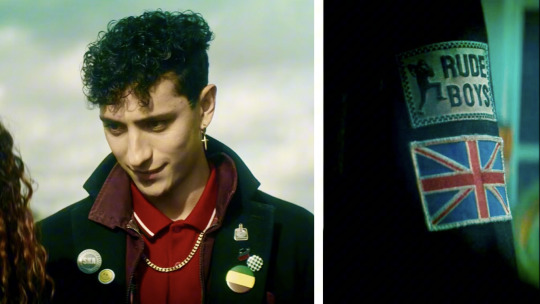
in the show, crystal’s hero color is purple, which you’ll notice in her velvet coat and long silk letterman jacket, which dunsmore thought of as a psychic cloak with hand-embroidered patches, including the wilting rose of england.
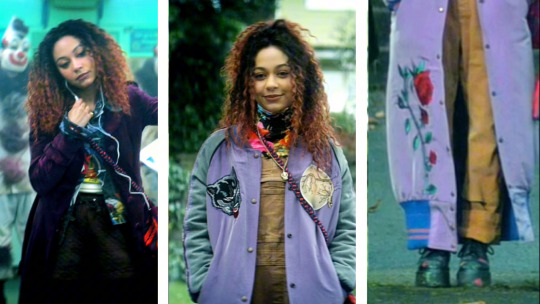
her brown trench coat represents an explosion of everything going on in her mind. dunsmore decided the scribbled words and drawings are a result of crystal writing all over it to express her inner turmoil. there are even lyrics on there from the song she’s listening to on the tube when she meets the dead boys.
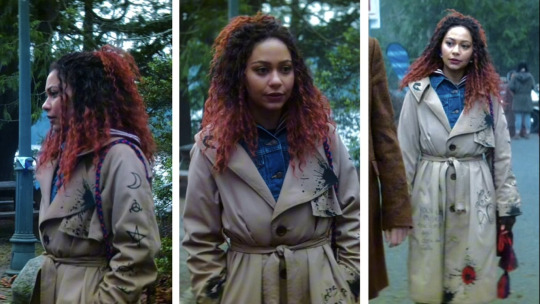
david’s connection with crystal seeps into her wardrobe, too. since david wears a flower shirt, dunsmore’s team hand-painted flowers onto crystal’s black boots. and niko is wearing a dark sweater with flowers on it when we first meet her, as an homage to crystal. the costume department also drew the same rune pattern the dead boys use to exorcise david in episode 1 onto crystal’s trench coat and on the tab of her wool bomber jacket. “so she’s always got some sort of protection,” says dunmore.
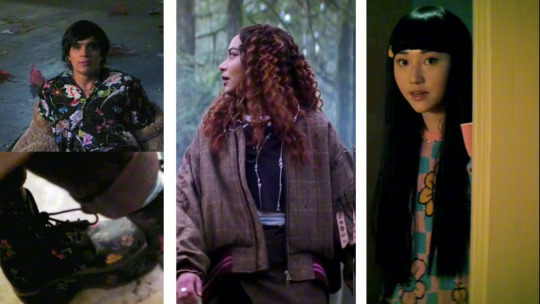
every color niko wears is inspired by what’s happening in that episode, from the green post-sprite exodus to blue when she’s feeling sad. niko only wears a white look, with nods to her japanese heritage, in the finale as a reset. the charms on her obi belt represent the colors she’s worn all season.
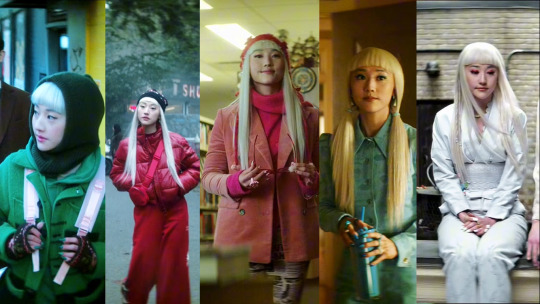
night nurse is someone who’s in control all the time and likes things to be in their proper place. dunsmore looked to vivienne westwood for inspiration, since everything in night nurse’s world is a bit exaggerated. (by the way, niko’s orange monochromatic look is a nod to her scenes with night nurse and night nurse’s red hair.)
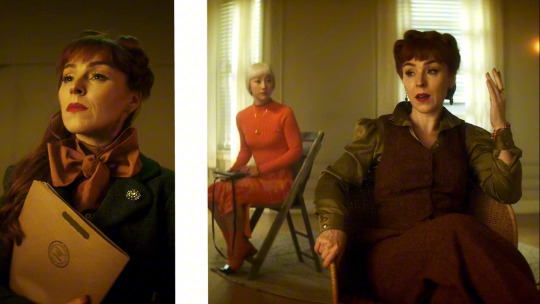
since david is a demon, he finds a london boy that looks cool enough for crystal to find attractive. that meant dunsmore dressing him in a shearling jacket you’d find in “all the guy ritchie movies,” black pants and creeper shoes. the costumer’s mood board for “david the d” featured radiohead and amy winehouse and her husband blake, who often wore hats similar to the one you see david wearing in the show.
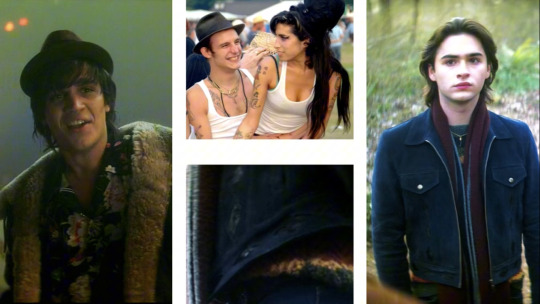
pay close attention to monty’s leather jacket and you just might spot an inlaid crow feather or two.
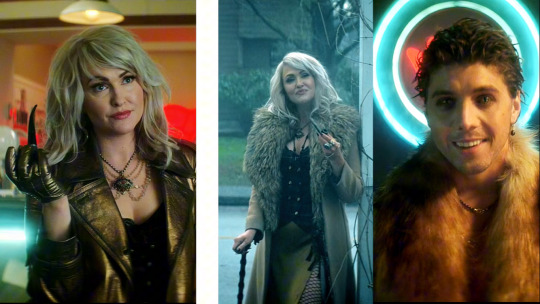
it’s not only esther who wears clothes with a gilt, old-gold color — cat king and night nurse also do as a nod to their villainy. (esther and cat king also have similar fur coats.) amidst her beauty, dunsmore wanted esther to be a little rough around the edges. she wears a cuff around her hand that’s adorned with a snake and a ring with teeth all around it to represent the teeth she’s collecting from all the little girls. her eye necklace is meant to be her witch pendant.
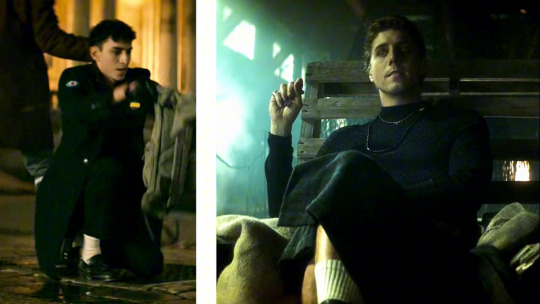
mischievous as ever, cat king has (cat) eyes everywhere and is aware of edwin’s affection for charles. so he wears charles’ socks the first time he meets edwin.
#well this is a very long post with an analysis of each character's costumes#charles rowland#dead boy detectives#edwin paine#edwin payne#niko sasaki#crystal palace#monty the crow#esther finch#night nurse#george rexstrew#jayden revri#payneland#painland
2K notes
·
View notes
Text
The Tale of Tale movie analysis (1)
It has been a long time since I did a fairytale movie analysis, and for this month I want to take a look at a movie that has been asked of me before, a long time ago: "Tale of Tales".
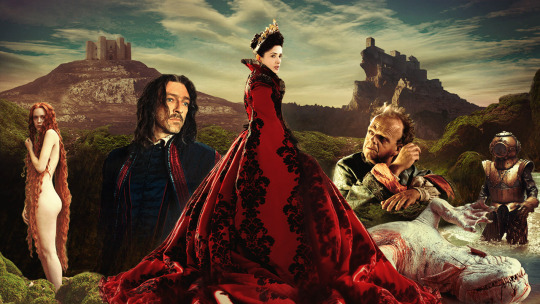
For those of you who do not know about this movie, "Tale of Tales" is a 2015 movie, a "European production" (it is an Italian movie, but it received help and collaboration from France and England, hence the "European" etiquette) that is to this day (and to my knowledge) the only movie that adapts Basile's Pentamerone, the titular "Tale of Tales".
The Pentamerone being one of the two foundational works when it comes to literary fairytales, and one of the two great books of classical Italian literary fairytales alongside Straparole's Facetious Nights. Basile's book is very famous for containing some of the earlier literary records of fairytale types such as Rapunzel, Sleeping Beauty, The Girl Without Hands, and more.
The book contains a total of fifty stories, and of course the movie couldn't adapt them all, so it was decided to only adapt three in total. The three chosen are usually considered emblematic stories of the Pentamerone - but they were also selected because they do not echo the more well known Grimm stories. The three selected were, The Flea, The Enchanted Doe, and The Flayed Old Lady - all taken from the first part of the book.
Note that this movie was greatly acclaimed for its extensive use of practical special effects - and there is one thing you cannot deny this movie, it looks absolutely incredible. There is a great effort on the visuals ranging from selected architecture and landscape to careful costume crafting and delightful monsters on screen.
Before going into the analysis of each of the fairytales of the movie, I wanted to point out a few things covering the entirety of the movie. Three details to be exact.
Matteo Garrone, when doing this movie, didn't just randomly selected three stories that were to his fancy. He chose three specific stories that he then tied together with cohesive themes and motifs. The first of which, the most prominent, being "obsession". Each segment is about presenting the obsessions of specific characters, and the bad outcomes of it.
The other shared motif between the three fairytales is "the ages of a woman". Despite the movie having as much male as female characters, Garrone explained very clearly that this movie was about the women, not the men, and that each fairytale represented one of the traditional three "ages of woman". "The Flea" becomes the Maiden story, focusing on the young princess ; "The Enchanted Doe" becomes the Mother story, with an exploration of the character of the queen, while "The Flayed Old Lady" is of course the Crone tale.
But much more importantly for us to understand this movie: Matteo Garrone did one very heavy and important change compared to the original material. The tone. The tone is radically different. Basile's original book, just like Straparole's fairytales, worked by the specific nature of these Italian literary fairytales of the time: they were grotesque farces, and vulgar jokes. In my last post about the Pentamerone I compared these stories to a Brandon Rogers video, because Basile's stories, despite being the ancestors of the Grimm or Perrault fairytales, are nothing like the modern fairytales we are today. They are sex stories filled with caricatures, they are gruesome, gory stories filled with morally-gray characters, they are one huge dark joke filled with poop and farts and vulgar allusions. They are much closer to medieval tales and to the tone of a Reynard the Fox story or some Rabelais books than any other fairytales we know today. But Garrone decided to apply a principle that you can see explored in series such as "Horace and Pete" or "Kevin can fuck himself". Take a sitcom, remove the laugh-track, you have a tragedy. Garrone's movie is still as grotesque as the original stories - but now the jokes are put aside, the most vulgar parts removed, the sex and the gore examined for what it is under a realistic eye. This "realistic", and "non-comical" treatment of the stories make this world of grotesque caricatures and senseless violence and depraved debauchery one not of marvels and fairies, but one of tragedies, of abuse, of horror. But, tragedies with magic, abuse with beauty, horror with happy and hopeful endings - because they stay fairytales after all, no matter how dark they are. Mean, cruel, sad fairytales, but fairytales nonetheless.
[Trivia: The fact that Basile's work was a very rude, crude and vulgar piece of sex-and-violence that can only be compared to Rabelais meeting Punch & Judy, is something many people in the English-speaking world completely missed because the first real popular and widespread translations of the text in English, in the... I think it was the 19th century or maybe a bit earlier ; but these versions were heavily censored. Trying to make the story more like a Perrault or d'Aulnoy tale, they removed many sex references, remove all the poop jokes, and even cut off some stories deemed too vulgar ot gruesome, so that for a very long time people thought they were supposed to be... regular fairytales. This is especially relevant with "Thalia, the Sun and the Moon", Basile's "Sleeping Beauty" variant. Many people point out that the girl in this story gets raped by the prince and that this shows how the fairytale of Sleeping Beauty was built on a glorification of rape, because it is treated as ormal or as some romance. But... no. This rape is treated as a rape and the prince is very clearly a lustful asshole who is taking advantage of the girl - because it is a dark sex-tale. Princes in the Pentamerone are almost all lustful rapists, violent murderers or complete helpless idiots, because the Pentamerone does not work on a "prince charming" logic. Take "The Golden Root" - the handsome, kind, gentle, good prince that seems to fit the bill of the Prince Charming... is part of a family of ogres, and ends up murdering in rage his intended fiancée just to be married to the heroine of the tale. And that's something that many people missed for a very long time - the prince charming archetype is from the French tales of the 17th and 18th century, not before.]

43 notes
·
View notes
Text
Analyzing Illumi Zoldyck's Character
Chrollo Analysis | Hisoka Analysis | Killua Analysis
What’s up y’all! Sorry for being away for the last few days. I needed a break from social media because I am so tired of seeing toxic, self-righteous people on my TL. Anyway, quite a lot of you liked my posts about analyzing HxH characters and somehow comparing them to VLD characters. Today, I’ll be talking about Illumi Zoldyck and I’ll try to compare him to a Voltron character. I know many people have already analyzed this character before, but it wouldn’t hurt to add to the discussion some years later. If you want me to write about anything else, send me an ask! The formatting of this post may be different than the one I wrote about Hisoka Morrow (click his name to view that post).
HERE WE GO!
In the first season, all of the characters are contestants for the Hunter’s Exam. I say contestants because this is a contest to see who can win without any injuries and can keep up with each host. I forget what number stage they were at, but I do know they were at the stage where each opponent has to fight each other. They are declared the winner if their opponent forfeits or gives up mid-match. (Off-topic, but) I am going, to be honest; Gon was my favorite character but his flaws began to show, annoyed me, and later led to his horrific downfall (based from YouTube clips). He didn’t know when to stop and kept pushing himself over the limit. Anyway, Killua and Gittarackur are set to fight. This is when things take a turn for the worse.
Gittarackur is a form of a disguise for Illumi to mask his identity. His face is long; nearly (and reminds me of) in the shape of a Tiki. His face also reminds me of the Witch Doctor mask from Scooby-Doo and Hell-raiser. He has several pins stuck in his face to maintain the facial features of Gittarackur. On the flip side, if he removes the pins, his biological form is revealed. Once he does this, Killua is nearly paralyzed; he cannot believe his eyes and I’m sure the trauma he endured at home hit him like a sack of rocks. Illumi then tells Killua that he wants him to return home, that he cannot maintain a friendship with Gon, stated that he was going to kill Gon, but realizes that if he does so he will be disqualified and will not obtain his Hunter’s license.
I’m assuming the cops aren’t a thing in this reality and the only way for them to “destroy” under the law is by obtaining the license. What do you think? I rarely see police officers; all I see are the Mafia and every they suck compared to the Zoldyck's and the Phantom Troupe. Shit, it seems like they’re the police but have twisted motives.
It doesn’t matter if you’re a fictional character or not, first impressions matter and he bombed this one...even for a villain.
But you did this for what?
How can you hypnotize (by using Nen) your own brother into killing another opponent because he doesn’t want to become an emotionless zombie like you? At least, that’s my perception. Telling your brother to run every time he faces an opponent that he knows he cannot win against is the sickest shit I’ve ever seen. I know I’m jumping around but another thought popped into my head. As the seasons go on, Illumi expresses an odd way of loving his younger brother and to him, that means to make him suffer in the same way he had to. It seems like Illumi is jealous of Gon in a way. (I’ve seen clips on YouTube) Killua takes Alluka to the hospital to heal Gon. Illumi has stated several times to Hisoka that Killua was hiding rules from him and that he still wanted to get rid of Alluka. Although it is clearly stated why he wanted Alluka gone, I still think that Illumi was jealous of Gon simply because his younger brother preferred to be with a friend instead of him. This is why he emphasizes “You cannot have friends. Either they will betray you or you’ll betray them.”
As I read and watched as the seasons went on, I noticed something about Illumi and his family. We all know that the children were raised by their parents. Specifically, their dad is a trained assassin. I can’t remember but I think Zeno is their grandfather who is also an assassin.
I view him as a character that has suffered from abuse and trauma in order to mold him into an assassin. He is emotionless, doesn’t really care for others, has an odd relationship with Killua that he doesn’t have for his other siblings, and is a hypocrite. Killua can’t be friends with Gon but every time the show cuts to him, he’s with Hisoka? Something is fishy there. Are they more than friends? OK, thanks for coming to my Ted Talk. Here's the physical analysis below.
Face
When masquerading as Gittarackur, his face has several pins in them and his hair is in a rock star form of Mohawk that is purple. I’ll give him 10/10 for uniqueness, yet it still reminded me of Hell Raiser.
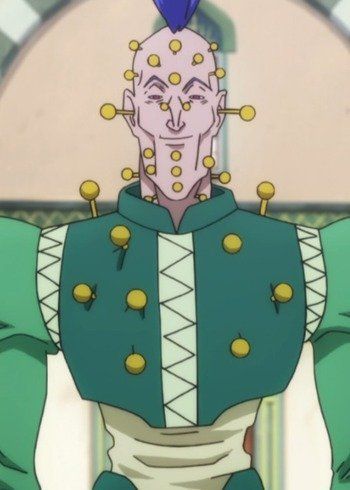
I’ve noticed that when he is in public he is in costume. Why doesn’t he reveal himself in public? I’ve researched this and no one could answer this question. My guess is that he is a verified hunter and assassin. How can you carry out your missions if everyone knows what you look like? Without the pins in his face, it reverts back to his natural state. To me, his large eyes and long, shiny black hair are his distinguished features. Although he may be my least favorite character, he does have pretty eyes. Haven’t you all heard of “I got lost in his/her eyes”?

Yeah, that can be said about him. Most definitely. He rarely smiles and when he does, something BAD is going to happen. I saw him laugh crazily once Alluka began the healing process, the Nen (I guess) rose from the hospital and got on him. This scene reminds me of how Haggar reacted once the Komar’s quintessence bounced from Voltron and bounced onto her. Wow, these supernatural abilities make y’all feel that good?
Clothes
Gittarackur and Illumi wear the same clothes, which should be a clear giveaway that they are the same. Illumi wears a neural green short jacket that has yellow pins in them, a light green shirt underneath, and green pants. His shoes remind me of loafers with a heel on them, something my grandmother would wear.
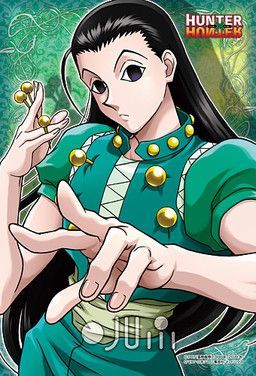
I’ve said this before and I’ll say again, these bad-ass men in this show are very stylish and seem to be in shape more than I am. Although Illumi irks me, his fashion is great and this is why people prefer him to be their favorite character. Shows should always produce characters that are memorable; that is the key to a long-lasting fan base.
In conclusion, this anime (for the most part) has well-rounded characters that make the plot interesting and wanting more.
Illumi and Lotor are somewhat similar. They both grew up in abusive households and lost some sense of sensitivity, common sense, and were often “misguided” by their own selfishness. Illumi wants a better life for Killua by constantly brainwashing him into thinking that he cannot have friends and his can only find happiness through killing. Zarkon raises Lotor to be a prince that shouldn't work with planets and should destroy them. This explains why he used deceased Alteans from the colony, drained their quintessence, and didn't give them a proper burial. Lotor IS just like his father but Killua IS NOT like Illumi. Ironic, huh? As we all know by now, Lotor is the son of Honerva (Haggar) and Zarkon. After the rift accident, he became an emotionless, ruthless monster that colonized and destroyed planets just to gain their quintessence. He taught this to his son and once he was old enough to think for himself, he refused to act in such a way. Although he was exiled and said he wasn’t like Zarkon, he was; but worse. Lotor studied and gained knowledge about Altea and its people while using Allura to gain the secrets of Oriande. I say he used her because he knew from the moment he met her that he was harvesting Altean quintessence. While fighting the white lion, he yelled “Victory or Death” which is a common catchphrase the Galra use when they are in battle. In fact, the Galra have been victims of trauma from Zarkon. Zarkon’s ruthless ways of ruling had no other motive except for obtaining quintessence so he could live forever. Silva’s way of raising his children was done to mold them into assassins. Since he was taught this way he did the same thing to his children. Zarkon, Silva, and Zeno think that their ways of parenting are necessary for survive in life when it doesn’t have to be that way. Illumi and Lotor have experienced this horrific parenting and deal with it in different ways. Illumi is oddly obsessive of his younger brother and Lotor is a fucking liar.
This analysis was fun! Next, I’ll be analyzing Killua and Keith Kogane.
If you’d like to see more posts like this, send me an ASK!
#illumi x you#illumi x reader#illumi zoldyck#silva zoldyck#yandere zoldyck#milluki zoldyck#alluka zoldyck#kirua zoldyck#killua zoldyck#zoldyck family#hunter x hunter#shiro phantom vox writes#hunter x hunter thoughts#lotor voltron#vld lotor#prince lotor#emperor lotor#voltron legendary defender#voltron netflix#hunter x voltron#hunter x voltron crossover#gon freecss#hisoka#hisoka morrow#hunter exam#silva#zeno zoldyck#zarkon#zarkon voltron#haggar voltron
188 notes
·
View notes
Text
Ethics and morality... and how they're not the same...
Weird title, and I don't even know if I'll properly approach this one with all the topics I wish to this discuss in today's The Devil Judge essay, because a lot of things peaked my interest, I was debating on doing a separate post for each subject, but I'll do them all in here:
Starting simple
I know we're only 4 episodes in, but I want to break down the things that I often look for in a new show:
Cinematography
Soundtrack
Character building
Plot devices
Social commentary (sometimes)
Of course, these are things most people would consider basics, but I find that a lot of TV shows don't have enough balance in them. Also, cinematography and soundtrack are pretty up there for me because when a plot gets slow, or something like that, I stay for those two (biggest example: King Eternal Monarch).
The soundtrack in The Devil Judge is amazing and the cinematography can be a character of its own. They really get me hooked and are used as tools to properly tell a story. And I'll get into that further down this post.
The onlooker will never understand the actor
Experience is your best friend not only applies to job hunting, but it's true in the real world too. You can't truly weigh in on something unless you've experienced it yourself, you can give it your judgment and everything, but when bad things happen to someone, you'll never truly understand their pain. Am I bringing up because of the difference of mind in Judge Kang and Judge Kim's opinions? On how the public treated the minister's son? No. I'm talking about a very specific scene, where the cinematography told me to think that way and not the dialogue (it's that easy for my mind to be swayed). In episode 3, when the rich are about to dine right after the foundation's commercial for a better future, we see this aerial shot:
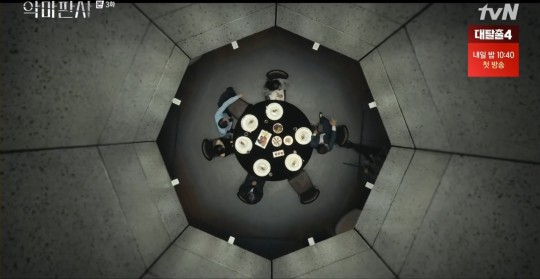
What's interesting about this? The seclusion and the enclosed feeling it conveys as a counterpart to the poverty shots we were just shown. Yet, these are the people making ads for a better future, what do they know?
They live comfortably behind concrete walls with no windows to see what goes on apart from the bubble they live in. This idea is further enforced at the party in episode 4, where they're not even a part of the donations, and watch and mock from afar as spectators. Yet, these people call the shots. They even call it commenting, as if they were watching the pain of others on TV.
The intriguing personality and the duality it encites
Now, this was a costume and wardrobe decision, but it was also very well thought of:
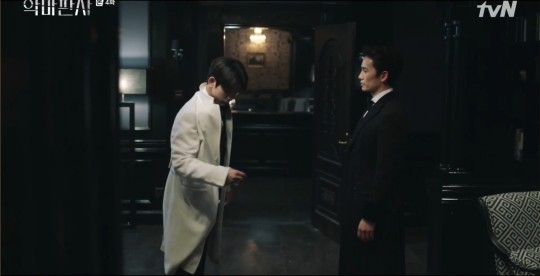
Judge Kim wears white and Judge Kang wears black. One is morally perceived by viewers of the show as morally good and the other is perceived as morally dubious at best. However, besides the costume and wardrobe thought put into this, we also have to think about the delivery of this scene and how it may further affect my detailing of this section. Judge Kang brings down the coats, and hangs over the coat to Judge Kim, he's the one who is making that annotation: You're pure, I'm tainted. This can have one of two interpretations:
Either Judge Kang believes Judge Kim to be pure and innocent due to his status as a rookie in the field
Or he believes Judge Kim to be morally white and himself morally black as he's looking at his brother's face and not at Judge Kim's heart.
Because most of the back story we're unveiling is through Judge Kim's perception, there's also an inherit bias we're having as well, because in Judge Kim narrative, he believes he's doing what's right and believes Judge Kang to be evil. In being served information about Judge Kang through Judge Kim's eyes, our bias is inherently skewed.
Another thing is that, when they put on the coat, they're standing in front of the other, as if the producers of this series are telling us they're two sides of the same coin.
The duality is made in more deceitful ways, which include:
A difference of classes that implies one has suffered while the other has not.
A difference of experience that implies one is more tainted while the other is pure.
A difference of age that implies one is a sly fox while the other one is is bunny about to be eaten.
A difference of temper that makes one erratic and the other logical.
Power dynamics
This one, in this one I could make a whole thesis based on just a couple of scenes in the drama. And you know I have to mention it: director Jung being the puppeteer.
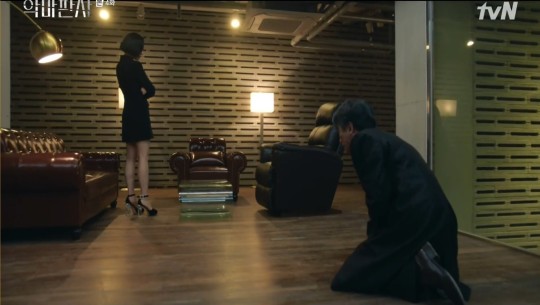
It may not be as unexpected at first, nevertheless it brings forward a lot of things I've wished to touch upon for quite some time now. A woman being a puppeteer of an old man in the portrayed dystopia that The Devil Judge is painting makes much more sense than more common demonstrations of these dynamics where it's either a:
A man of power being controlled by a bigger man of power.
A man of power being controlled by a seemingly man of a lower status.
A woman being controlled by a man of power.
Although, there's nothing wrong with those power dynamics, and if they were to be used, a message could also be conveyed, this one in particular works as a megaphone.
A subversion of power in such a way can be interpreted as a true indication of the weak overcoming the powerful. Why? It is not that woman are naturally weaker than men, but that in society, patriarchy has been a big factor in taking voice away from women in order to give it to men.
In order for Director Jung to achieve her purposes, it's smarter for her to do it under the pretense that an old rich man in power is the one calling the shots.
This is better exemplified by her stance when the old man tries to excuse his behavior, and what her moral compass is. I'm not saying I agree with her unethical conduct, but that her morality is directly impacted by the perception of the public of her as a weak woman:
Just because a dog bites a human does the person get dirty?
This is telling on how she perceives the actions of the old man in gropping the waitress. She didn't do anything wrong, even if you touched her, you are the dirty one.
While she's evil, it's a refreshing and deep evil.
The public's opinion and how there's actually logic in the show's portrayal
The public opinion can make or break a person, even if it's not on a public trial like this. While "cancel culture" barely works in today's society, a person's reputation is forever tainted. The show does tell that, but it also exhibits the scary downside of it, by showing how easily it was to make people accept flaggelation as a fitting punishment.
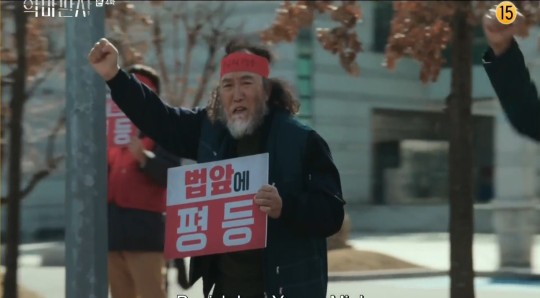
There are many experiments that have tried to test the effect of societal pressure on an individual's decision and the effect of the authority's enforcement of power in the outcome of these decisions. Furthermore, theories based on analysis of human behavior not necessarily relying on experiments can also help break this down. What do I mean? Here's a small attempt at explaining:
Milgram Experiment on Authority: which measured the individual willingness to carry out actions that go against their conscience due to an authority's approval.
Argument from Authority; The idea that people are more likely to use an authority's opinion on something as an argument for their reason. This is often seen in science, where trusted authorities have done the research and offer it to the public. In here, authority bias also plays a role, as we often believe, at first, that an authority must be right.
Moral disengagement: basically speaking, because this is evil or bad, I'm not part of it and I most probably am not actively participating in it. One may disengage by moral justification, which means that before engaging in something that has been previously perceived as immoral, I'm changing my stance on it based on what I tell myself to be logical arguments. This particular form of moral disengagement is very effective in changing the public opinion. I'll be touching on another form further down this post.
Other factors played a part, but these ones in particular came to mind when public flagelation as a form of corporeal punishment was wildly accepted. First, an authority is the one telling them it's correct, to go ahead. Secondly, another authority (the minister) had previously shown approval to such unusual punishment. Thirdly, they are not the ones to be engaging directly in the act, and even if they were, it would be acceptable because an authority has told them so. They may even believe the punishment to be a necessary evil for the greater good.
In fact, the minister's son was actually correct when pleading his case, they were accepting it because it wouldn't affect them directly.
Regarding the cinematographic descent of the public opinion regarding the situation can better be exemplified by the old man we've seen through the episodes.
Does suffering justify misdeeds?
Today I came along the difference between excuse and reason. You may give a reason for your behavior, but it doesn't excuse it.
Not because I've suffered through shit, means I have to make you suffer too.
I may explain myself, but it's on the other side to excuse me.
Why I hate the unreliable narrator and why I love it so much
This story has been told mostly through the eyes of Judge Kim and what he hears and sees regarding Judge Kang, if anything, the narrative is very close to that of the narrative we've seen in The Great Gatsby. An enigmatic man is being narrated to us from the eye of a man who hasn't known him for a long time.
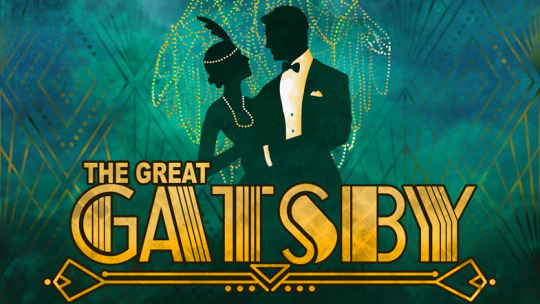
How is that an unreliable narrator? The narrator has their own set of bias and moral standards which function as lenses through which they see the world.
Another way of putting it would be the way teenage romances are often written in a first person narrative where either of the two teenagers is the narrator, so the author can sell to us something as simple as offering a pack of gum as the most romantic act on earth. We're perceiving interactions through rose tainted glasses.
In this case, we're seeing the interactions through Judge Kim's eyes who doesn't trust Judge Kang from the get go due to his own preset bias.
The narrative becomes even more unreliable as we're not exactly sure if what Judge Kang disclosed himself is a fact.
The reason why I love this narrative is because it leaves a lot of space to make simple plot twists to a narrative and make them seem grand, and can elongate a story without making it obvious.
The reason why I hate it is because sometimes, in tv shows mostly, we as viewers can see the other side of the story and grow increasingly frustrated with the main character's prejudice and misunderstandings (I'm looking at you my beloved Beyond Evil).
Also, because I have to wait for a long time before I actually have a clear picture of it.
#kdrama#kdramas#kdrama recommendations#analysis#rant#the devil judge#got7#park jinyoung#ji sung#kdrama meta#kdrama quotes#kdrama analysis#meta#the great gatsby#kim min jung#please dont let this flop
98 notes
·
View notes
Text
MAD MEN BOOK RECS
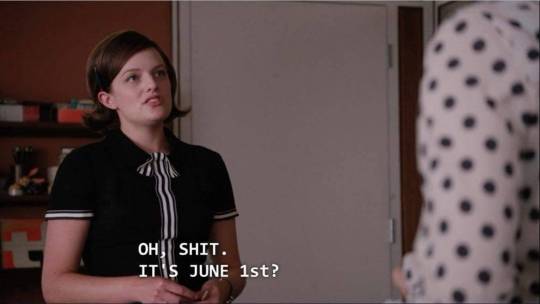
Happy pride/Don Draper’s fake birthday ❤️ Below the cut, I’ve listed info on my favorite Mad Men related books and a couple I haven’t read yet but I’m really looking forward to. Let me know if you check any of these out, or if you have any other recommendations! ❤️
Mad Men Carousel: The Complete Critical Companion by Matt Zoller Seitz
“Mad Men Carousel is an episode-by-episode guide to all seven seasons of AMC's Mad Men. This book collects TV and movie critic Matt Zoller Seitz’s celebrated Mad Men recaps—as featured on New York magazine's Vulture blog—for the first time, including never-before-published essays on the show’s first three seasons. Seitz’s writing digs deep into the show’s themes, performances, and filmmaking, examining complex and sometimes confounding aspects of the series. The complete series—all seven seasons and ninety-two episodes—is covered.
Each episode review also includes brief explanations of locations, events, consumer products, and scientific advancements that are important to the characters, such as P.J. Clarke’s restaurant and the old Penn Station; the inventions of the birth control pill, the Xerox machine, and the Apollo Lunar Module; the release of the Beatles’ Revolver and the Beach Boys’ Pet Sounds; and all the wars, protests, assassinations, and murders that cast a bloody pall over a chaotic decade.
Mad Men Carousel is named after an iconic moment from the show’s first-season finale, “The Wheel,” wherein Don delivers an unforgettable pitch for a new slide projector that’s centered on the idea of nostalgia: “the pain from an old wound.” This book will soothe the most ardent Mad Men fan’s nostalgia for the show. New viewers, who will want to binge-watch their way through one of the most popular TV shows in recent memory, will discover a spoiler-friendly companion to one of the most multilayered and mercurial TV shows of all time.”
A classic episode-by-episode look at the series from reviewer Matt Zoller Seitz.
The Legacy of Mad Men — Cultural History, Intermediality and American Television (Edited by Karen McNally, Jane Marcellus, Teresa Forde, and Kirsty Fairclough)
“For seven seasons, viewers worldwide watched as ad man Don Draper moved from adultery to self-discovery, secretary Peggy Olson became a take-no-prisoners businesswoman, object-of-the-gaze Joan Holloway developed a feminist consciousness, executive Roger Sterling tripped on LSD, and smarmy Pete Campbell became a surprisingly nice guy. Mad Men defined a pivotal moment for television, earning an enduring place in the medium’s history.
This edited collection examines the enduringly popular television series as Mad Men still captivates audiences and scholars in its nuanced depiction of a complex decade. This is the first book to offer an analysis of Mad Men in its entirety, exploring the cyclical and episodic structure of the long form series and investigating issues of representation, power and social change. The collection establishes the show’s legacy in televisual terms, and brings it up to date through an examination of its cultural importance in the Trump era. Aimed at scholars and interested general readers, the book illustrates the ways in which Mad Men has become a cultural marker for reflecting upon contemporary television and politics.”
This is a really beautiful collection. It was published in 2019. It’s rather expensive. (I found a used copy for much cheaper.) If you can afford it, I really, really recommend buying it. There is a pdf floating around if you know where to look though. But like I said, it’s really amazing work and the women who curated it deserve high praise and compensation.
A few favorite essays of mine include “Don Draper and the Enduring Appeal of Antonioni’s La Notte” by Emily Hoffman, “Mad Men’s Mid-Century Modern Times” by Zak Roman, “Mad Men and the Staging of Literature via Ken Cosgrove and His Problems” by Aaron Shapiro, and “What Jungian Psychology Can Tell Us About Don Draper’s Unexpected Embrace of Leonard in Mad Men’s Finale” by Marisa Carroll.
Mad Men and Philosophy: Nothing Is as It Seems (Edited by William Irwin, James B. South, and Rod Carveth)
“With its swirling cigarette smoke, martini lunches, skinny ties, and tight pencil skirts, Mad Men is unquestionably one of the most stylish, sexy, and irresistible shows on television. But the series becomes even more absorbing once you dig deeper into its portrayal of the changing social and political mores of 1960s America and explore the philosophical complexities of its key characters and themes. From Socrates, Plato, and Aristotle to John Kenneth Galbraith, Milton Friedman, and Ayn Rand, Mad Men and Philosophy brings the thinking of some of history's most powerful minds to bear on the world of Don Draper and the Sterling Cooper ad agency. You'll gain insights into a host of compelling Mad Men questions and issues, including happiness, freedom, authenticity, feminism, Don Draper's identity, and more.”
This collection was published just a month before the start of season 4, so it only concerns the first three seasons of the show. As such, it includes some assumptions that are proven false and a few strange misreadings that I’m sure would’ve been cleared up had they had the rest of the show at their disposal. But there are some great philosophical insights and analysis.
I haven’t yet read the whole collection, but my favorite essay of what I’ve read so far was “Pete, Peggy, Don, and the Dialectic of Remembering and Forgetting” by John Fritz.
The Fashion File: Advice, Tips, and Inspiration from the Costume Designer of Mad Men (by costume designer Janie Bryant)
From Joanie's Marilyn Monroe-esque pencil skirts to Betty's classic Grace Kelly cupcake dresses, the clothes worn by the characters of the phenomenal Mad Men have captivated fans everywhere. Now, women are trading in their khakis for couture and their pumas for pumps. Finally, it's hip to dress well again. Emmy-Award winning costume designer Janie Bryant offers readers a peek into the dressing room of Mad Men, revealing the design process behind the various characters' looks and showing every woman how to find her own leading lady style--whether it's vintage, modern, or bohemian.
Bryant's book will peek into the dressing room of Mad Men and reveal the design process behind the various characters' looks. But it will also help women learn how fashion can help convey their personality. She will help them cultivate their style, including all the details that make a big difference.
Bryant offers advice to ensure that a woman's clothes convey her personality. She covers everything from where to find incredible vintage clothing and accessories to how to pair those authentic pieces with modern shoes and jeans. Readers will learn how to find their perfect bra size, use color to convey a mood, and invest in the ten essentials every woman should own. And just so the ladies don't leave their men behind, there's even a section on making them look a little more Don Draper-dashing.
I recently ordered a used copy of this book and haven’t yet received it, but I’m very much looking forward to it. Like Mad Men and Philosophy listed above, it was published between season 3 and 4, so unfortunately does not cover the whole show. It sounds like it might just cover the women’s costume design, though I’m not sure. Janie Bryant is such a meticulous, genius costume designer that I can’t wait to read it. Relatedly, you should follow her incredible costume design instagram where she posts lots of her work from Mad Men and other shows with fascinating insight into her process.
The Universe is Indifferent: Theology, Philosophy, and Mad Men (Edited by Ann W. Duncan and Jacob L. Goodson)
Centered on the lives of the employees at a Manhattan advertising firm, the television series Mad Men touches on the advertising world's unique interests in consumerist culture, materialistic desire, and the role of deception in Western capitalism. While this essay collection has a decidedly socio-historical focus, the authors use this as the starting point for philosophical, religious, and theological reflection, showing how Mad Men reveals deep truths concerning the social trends of the 1960s and deserves a significant amount of scholarly consideration. Going beyond mere reflection, the authors make deeper inquiries into what these trends say about American cultural habits, the business world within Western capitalism, and the rapid social changes that occurred during this period. From the staid and conventional early seasons to the war, assassinations, riots, and counterculture of later seasons, The Universe is Indifferent shows how social change underpins the interpersonal dramas of the characters in Mad Men.
I only just found out about this collection, but I’m very interested in finding a copy. This was published in 2016. You can see the table of contents here.
EDIT: This book is available to read on Scribd. They offer a 30 day free trial.
59 notes
·
View notes
Text
flaxenhairedsamurai replied to your post “An analysis of Jasper's Act II costume design“
I think I read on tvtropes that the design on the petals of the collar incorporates Sylvando's family crest into it. The heart is similar to the shoulderpads of Sylv's don outfit. Would you agree with the theory that this shows his envy towards Sylv 'stealing' Hendrik when Hendrik went to train in Puerto Valor?
...Wait, what? Huh? Where is this TvTropes information coming from? Unless there is an official source explaining this theory, it sounds nonsensical and very out of character in my opinion. I’m a little taken aback that this is a theory people have.
(Using female pronouns and the name Sylvia for Sylv because this)
First, the designs are not really that similar.
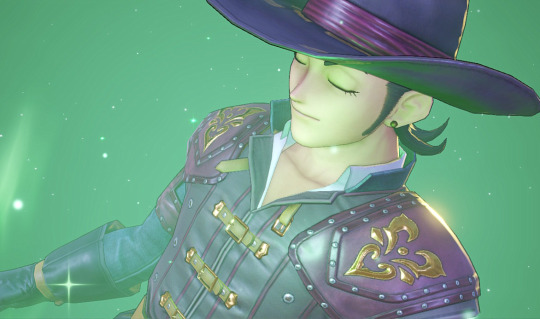
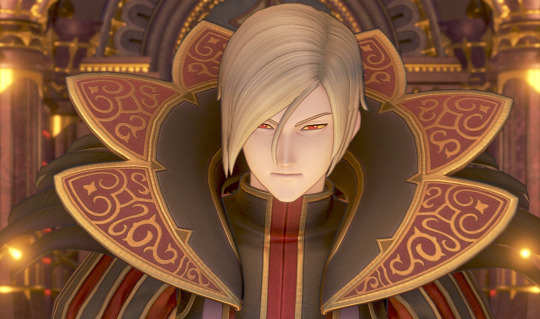
I don’t see any common resemblance to any “family crest”. The only thing they have in common is the fact that there is a heart/spade shape involved; but the stylization is very different. You could interpret them both as resembling an abstracted flower too I guess, but again, very different shapes and designs involved. To claim that they are the same “crest” is a reach.
Second, why would Jasper have any interest in copying Sylvia’s family crest? What reasons would Jasper have to perceive Sylv as “stealing” Hendrik from him? There is no evidence for this in the game at all, and I don’t recall seeing anything remotely related to this topic in the character book, art book, or any of the CD dramas.
The only interactions between Sylvia and Jasper that occur in-game are in Gondolia:
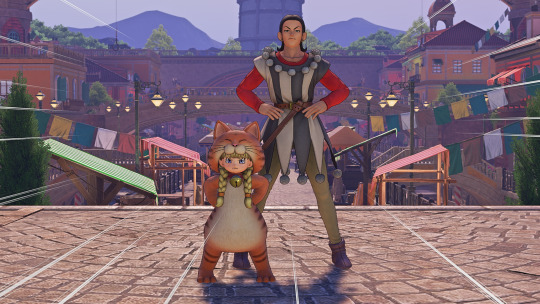
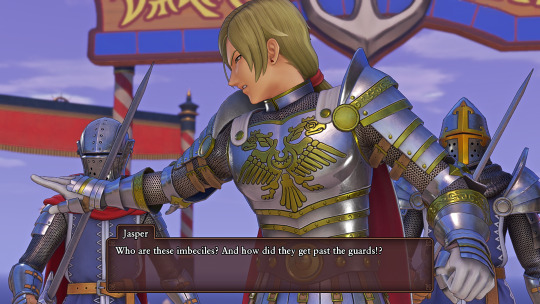
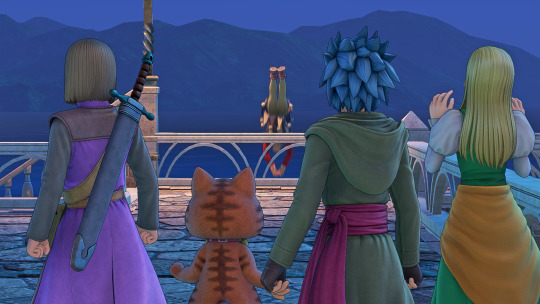
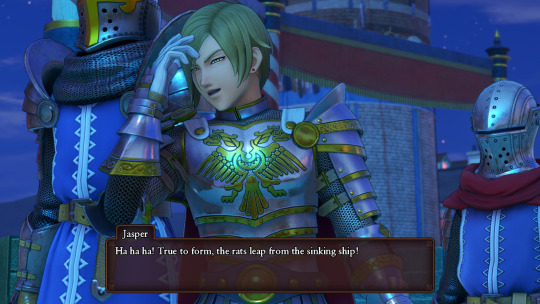
If there was any sort of animosity between them, shouldn’t they have more interactions beyond this scene? The idea that Jasper has any reason to think Sylvia was “stealing” Hendrik doesn’t make sense when you examine the canon facts.
Sure, Hendrik and Sylv trained and sparred together in Puerto Valor. But judging from how they talk about each other in their party chats, their relationship back then was more like friendly acquaintances than a complete friendship. It’s likely that Jasper also met Sylvia at some point because he trained there too, though he wouldn’t know her well because he didn’t study there as long (he left to study in Sniflheim). There’s no reason here for Jasper to think Sylv was “stealing” Hendrik.
...Especially because back then, Jasper was a much less resentful and hateful person. Even if Hendrik and Sylvia did appear to be getting along very well and forming a close friendship, I don’t think it would bother Jasper unless Hendrik seemed to value the new friendship more. Which, again, I don’t think is very likely, based on how Hendrik and Sylvia talk about their younger interactions. Until Mordegon got between them, Hendrik and Jasper consistently considered each other their best friend.
Also... all of that was way back. The Spectral Sentinels did not form until Act 2 of the game. Why would Jasper base his Act 2 outfit on Sylv’s family crest because of Hendrik possibly befriending her 20 years ago? Seems very excessive and hard to believe. There’s also the fact that Sylvia went missing from the public eye when she ran away from home to join the circus, changing her name and identity in the process. How would Jasper see her as a threat to their friendship? It took Hendrik a while to recognize her; Jasper doesn’t seem to recognize who she is at all.
Furthermore, even ignoring these facts, for much of DQXI, Hendrik’s interactions with Sylvia seem like he is uncomfortable around her due to her outward flamboyantness. I would argue that she makes Hendrik feel unsure in his own masculinity. It’s not explicit, but it also seems like she makes Hendrik confront a little bit of internalized homophobia as well; he has idealized and internalized rigid knighthood so much, that her rejection of it confuses him. He often seems hesitant to compliment her and acknowledge her talents (”I do not need your approval, minstrel”, etc). It makes for pretty good character development in Act 3 when he finally starts trying to understand her after all they have been through together (or, in the second timeline, after Don Rodrigo’s quest).
My point here is this: within the scope of the game’s events, there really is no reason for Jasper to view Sylvia as more than an “imbecile” jester traveling with the Darkspawn. I don’t think he has ever thought much about her at all. I don’t see how he has any reason to want to imitate her crest, even if he did view her as “stealing” Hendrik for...some reason. By the time Hendrik and Sylvia truly start becoming friends, Jasper is already dead. I just don’t agree with the theory at all. The designs don’t even look that similar.
#flaxenhairedsamurai#My cat walked over my keyboard and erased half of this while I was in the middle of typing it :I#But yeah. Weird theory. Seems totally OOC for Jasper and doesn't add up factually#Like am I missing or forgetting something...? Seems like a really misinformed fan theory
22 notes
·
View notes
Text
How to stage King Lear so that Edmund’s 100% more sympathetic and Gloucester’s 100% more of a jerk
( the prequel )
( the sequel )
(This is 100% about Edmund. If you wanna read stuff about other characters then this isn’t the post for you)
(Seriously this isn’t about anyone other than Edmund)
(This is your final warning- enjoy!)
(Or don’t I don’t care I’m really tired and I have midterms to study for)
General Staging
-every time Edmund and Gloucester are on stage together, they gravitate away from each other. Kinda like what happens when you try to push two magnets together. If one takes a step towards the other, the other moves away.
-Gloucester rarely ever looks at Edmund. He often walks in front of him when both are walking together. In scenes where a three way conversation is taking place between himself, Edmund, and someone else, he looks at the other person the whole time.
-Edmund faces away from people when he’s lying to them. Often by standing in front of them (but like, across the stage from them so the audience can see them both) (like this—->)
(I deleted the picture accidentally this is not ok now I have to draw it again)

Casting/ Costumes
-(I’m only gonna be talking about the characters that I actually care about how they’re cast)
-Edmund: someone of average height, yet shorter than Gloucester, Edgar, and Cornwall. Around the same height as Albany and Goneril. Taller than Regan. Is attractive (obviously. That’s one of the first things we’re told about him), but leaning more towards cute than hot (as per my analysis in a previous post). Wears shades of grey- all of his costumes make it clear that he’s upper class, but they’re not overly flashy.
-Gloucester: If I get even one Santa Claus vibe, I’m gonna punch a wall. He should have zero resemblance to Santa. I just saw a production of Lear where he may as well have been a mall Santa. I wanted to scream. Anyway. Onto what he should look like. I honestly don’t care, as long as i can’t mistake him for Santa. It’s the vibe that counts. ANYWAY. His costume is obnoxiously ostentatious, but it gets gradually more normal as the overall stress level increases.
-Edgar: taller than Edmund, and physically more muscular, but in like “Disney channel movie football player side character who’s no one’s primary love interest and is kinda dumb” sort of way. (Future Edette Editing: What I meant was “he’s a himbo”) He’s not ultra hot, but he’s not exactly ugly either. He’s pretty average looking. He wears shades of brown, because I feel like that suits him.
-Cornwall: tall but doesn’t give off Tall Person Vibes. Preferably with dark brown or black hair, but other colors can work as well. I cannot imagine him wearing anything other than suits that are mostly black with some shades of red somewhere- I don’t care how you incorporate the shades of red into his costume, as long as they’re there.
-Albany: has a dark shade of blond hair, or a medium shade of brown hair. Any other hair color just doesn’t work. (Future Edette Editing: any color hair other than black is fine for Albany). Dresses sensibly and wears really boring costumes.
-Goneril, Regan, and Cordelia have at least a little bit of a family resemblance. Please. Their costumes are similar as well- all wear standard types of clothes you’d expect the princesses of England to wear.
ACT 1 SCENE 1
- Gloucester and Kent enter the stage with Edmund trailing behind them. They’re entering the palace from outside. Idk how England’s weather works, but I decided that the whole play takes place in the fall. I’m not wrong. It does. It doesn’t feel like the sort of play to take place in any other season. You can all fight me on this in the comments, I have no evidence to back up this claim. Anyway, they’re all wear jackets. Because it’s fall.
-As Kent and Gloucester say their first lines, they take their jackets off. It’s hot inside the palace. Edmund leaves his jacket on. It’s not a heavy jacket. He’ll be fine.
-As Gloucester finishes up his first line “...can make choice of either’s moiety” he hands his jacket to Edmund. He does this in a very natural way- it’s clear this is something he does instinctively, without thinking about it. Edmund takes it. He takes it instinctively as well, without thinking about it.
-Kent, watching this says the line “Is not this your son, my lord?”. As in “hey dude. Isn’t he your kid? Why are you treating him like a servant or a coatrack?”
-at “His breeding, sir, hath been at my charge”, Gloucester puts a hand on Edmund’s shoulder in a “yes this is my son” sort of way. He does that a bit too roughly- not in any attempt to hurt Edmund, but definitely showing that he’s doing it for show and not in genuine fatherly affection.
-While Gloucester talks about Edmund, a waiter goes around with champagne glasses. Maybe they have actual liquid (ie water) in them, maybe not. I don’t care. Anyway, both Gloucester and Edmund take one.
-As Gloucester continues talking, he slowly sips whatever alcoholic beverage is in the champagne glass. (Probably champagne, but hey, I’m no expert on alcohol). NO, this isn’t to imply that he’s only speaking Like That (TM) because he’s drunk. He is not drunk.
-meanwhile Edmund downs the whole glass, in the standard theatre way of “I don’t wanna be here and I don’t wanna deal with this”
-Gloucester hands his empty glass to Edmund. He seems to suddenly remember that Edmund is, in fact, there. He says him line “Do you know this noble gentleman, Edmund?”
-At “my services to your lordship” he would bow or something (I don’t know English nobility etiquette, sorry), but he’s currently holding two glasses and a jacket, so he partially bows to the best of his ability.
ACT 1 SCENE 2
- A main set piece for this play would be a door or two on wheels that can be moved around. People really like entering and exiting buildings.
-ANYWAY. Edmund comes in through said door, currently located at the back of the stage. Gloucester house have a portrait of Gloucester family in huge on the wall. Gloucester’s in the middle, with Edgar on one said and Edmund on the other. At this point this should go without saying, but the gap between Gloucester and Edmund is much larger than the gap between Gloucester and Edgar. There’s also a desk and chair somewhere on stage.
-As he starts his first soliloquy, he takes off his jacket that he was wearing in scene 1 and drapes it over the back of the chair
-at “legitimate Edgar, I must have your land”, he turns towards the portrait and looks at Edgar. Then there’s a pause in the soliloquy as he goes over to the desk and writes The Letter (TM). Then he continues the soliloquy with “Our father’s love is to the bastard Edmund..”
-Gloucester enters. He doesn’t notice Edmund.
-As Gloucester asks Edmund for the letter, he and Edmund slowly circle around the stage, the way you’d see animals circling when they’re preparing to fight each other. They’re not going to fight. Not directly at least.
-Gloucester doesn’t make direct eye contact with Edmund for most of this scene
-Until he does, at the line “Give me the letter, sir.”. The line itself is said very forcefully. Both Gloucester and Edmund have stopped circling each other. They stand at opposite ends of the stage. There is a pause, and then Edmund takes the letter back out of his pocket and gives it as he continues saying his lines.
-Gloucester spends the remainder of the scene looking at the letter instead of at Edmund.
-“Edmund, seek him out..” is said very offhandedly, like he’s giving an order to a servant, rather than talking to his own son
-Gloucester leaves, Edmund sinks into the chair at the desk. He puts his head down on the desk and leaves it there for a solid second. He starts his soliloquy with his head still down. (Future Edette Editing: I still want something here to show that Edmund doesn’t get any enjoyment from this- he’s doing it out of anger, or as revenge, or to gain what should have been his, had things been slightly different, or possibly as a means of survival. Basically, he’s not doing this to have a fun time at deceiving anyone) He’s not enjoying what he’s doing- he’s not rejoicing at what is seemingly his success- he sees that it doesn’t make a difference. Gloucester would rather have no sons than only have him.
-Edgar enters. Edgar enters in a great mood. His optimism is turned up to a solid 100%.
-“How now, brother Edmund!” He speed-walks over to Edmund, who’s standing near the middle of the stage at this point. He does something brotherly- I don’t know what that would even mean, given that I am a girl with no brothers. He puts his arm around his shoulder or ruffles his hair or something. That’s the vibe I’m going for. The “haha yeah we’re siblings and we totally get along” vibe. Edmund is, however, not vibing.
(-if the second option is what we’re going with, Edmund takes a moment to fix his hair. A very short moment, but a moment none the less)
-Edgar notices that Edmund does not seem to be vibing, and that’s when he continues with his line “what serious contemplation are you in?”
- at “..go armed”, Edmund hands Edgar his own sword. This is the sword Edgar will later use to kill him.
ACT 2 SCENE 1
- On Edmund’s conversation with Curan: This is the first conversation Edmund’s having with someone without there being any uncomfortable tension between them. They talk in a casual way, and it’s clear that outside of the play they would be friends, regardless of status. Why would they be friends? Because I decided they should be.
-Edgar is doubly armed- with Edmund’s sword and with his own. He was planning on returning Edmund’s sword. When they “fight” Edgar uses Edmund’s sword and Edmund uses Edgar’s. They have different types of swords- Edmund’s- which is now Edgar’s- is slightly shorter and lighter. Edgar’s- which is now Edmund’s- is a two handed sword. These details are slightly irrelevant, but I feel like their weapon of choice (even though they’re using each other’s weapons (ie not their weapons of choice)) should match their personalities.
- Edgar just. Has NO idea what’s up with Edmund’s “hey we gotta sword fight now” thing. It should be clear to the audience that he’s ONLY going along with it because he trusts Edmund entirely.
-during the fight, Edmund slashes the family portrait with his sword, cutting a line between Edgar and Gloucester. Is this cliche? Yes. Must it happen anyway, because ✨symbolism✨? Yes.
-Edgar leaves through The Door I keep talking about
- Edmund stabs his non-dominant arm. This is relevant and important.
- “But where is he?” Gloucester hasn’t even noticed at this point that Edmund was injured in the “fight”. “Look, sir, I bleed!” Is Edmund’s attempt to get Gloucester’s attention. It’s his way of saying “I got injured for YOUR sake. THAT’S how good of a son I am!!”
- “where is the villain, Edmund?” The word “villain”, not the word “Edmund” is emphasized. While his seemingly innocent a son is standing there with his arm stabbed and bleeding, he’s more concerned with the son who supposedly plotted against him, but is currently running away now and is of no threat to him.
- (this is the point where I get really into @suits-of-woe’s Cornwall theory, because while I had never thought of it before, as soon as I read it I agreed with it completely. Please go read the theory if you haven’t already.)
- While Gloucester rarely looks at Edmund, Cornwall’s eyes go straight to Edmund as soon as he enters the room. Edmund doesn’t notice- he’s too busy trying to support his stabbed arm in a functional way without bleeding everywhere
-while Gloucester and Regan are talking, Cornwall calls a servant aside and whispers to him. The servant leaves. He asked the servant to get Edmund bandages because his arm has LITERALLY been STABBED and no one’s doing anything about it.
- Edmund’s focused on his arm until Cornwall’s line of “Edmund, I hear that you have shown your father a very child-like office”. Finally, someone appreciates him! At “It was my duty, sir”, it’s clear that there’s some sort of understanding between them. They somewhat get that they’re on the same side. There is a short pause.
- “...and received this hurt you see” Gloucester, being Gloucester, grabs Edmund’s injured arm to “show it off” to Regan and Cornwall. Edmund, master of hiding his emotions and such, winces for a millisecond but then goes back to “ah yes everything is ok and I am totally not condensed rage in human form”.
(Future Edette Editing: I am *so glad* I’m editing this because I really don’t like some of the stuff I shoved in here to try to cater this to a larger audience)
-after “..how in my strength you please”, that servant Cornwall called returns. As he says “For you, Edmund, whose virtue and obedience..” until the end of that paragraph Cornwall takes the bandage and bandages Edmund’s arm- I mean no one else is gonna do it. That, combined with the content of what Cornwall says in the paragraph, lead Edmund to be like “wait. Is this?? A father figure???” “a father figure? For ME???”
(-Hence the Cornwall theory I mentioned earlier)
- “I shall serve you, sir, truly, however else” this is the first line he’ll say in a way that it’s clear to everyone (mainly the audience) that he’s 100% sincere. He’s not trying to be deceptive. He’s not trying to trick anyone. He says it softly and truly means it.
-Edmund’s arm remains bandaged for the remainder of the play. (It’s not heavily bandaged or anything)
ACT 2 SCENE 2
- At “How now! What’s the matter?..” Edmund comes out holding Edgar’s- which is now his, I guess- sword. He’s holding it well enough, considering it’s a two handed sword and he just stabbed himself in the arm, but it’s pretty clear that he won’t be able to win a fight with it. Don’t worry, he’ll get a new sword before his final duel.
-at “no more, perchance, does mine, nor his, nor hers” “his” is referring to Gloucester, not Edmund. This isn’t because Cornwall is ignoring Edmund, it’s because that’s just the order they’re standing in. Edmund entered this scene first out of the four of them, so while Kent and Oswald are on one side of the stage, Edmund stands towards the middle, and Cornwall, Gloucester, and Regan stand at the other side.
ACT 3 SCENE 3
-Gloucester is angry in this scene. Why is he angry? Because I say so. He says all his lines in an angry and bitter way. Which may be counterproductive- having Gloucester be angry about how Lear is treated may make him more likable, which isn’t my goal. But I don’t care.
-Edmund says his paragraph at the end in a bitter and angry way too. Because ✨ parallels ✨
ACT 3 SCENE 5
-Cornwall is Gloucester’s opposite when it comes to how they react to/ treat Edmund. While Gloucester rarely looks at him and has an anti-magnetic effect, Cornwall stands near Edmund on the stage and looks at him both when he’s speaking to him and when Edmund’s replying. And not in a “good eye contact is important” sort of way, because Edmund faces away from people when he lies to them. Just for staging reasons, not because he can’t lie when facing people.
-Cornwall knows Edmund’s lying- he shows this by constantly moving so that he’s nearly always standing beside him instead of behind him (not actually directly behind him; scroll up for General Staging, where I explained this.)
-At “go with me to the duchess” Cornwall puts a hand on Edmund’s shoulder, directly paralleling Gloucester in Act 1 Scene 1. Because I really like ✨parallels✨. Except Cornwall, the same guy who said “thou shalt find a dearer father in my love”, does this in a much more- fatherly, I guess?- way than Gloucester did.
-At “if the matter of this paper be certain...” Edmund does what he does when he lies; ie tries to turn away and takes maybe half a step back. He pretty much trusts Cornwall enough to not walk halfway across the stage when he lies, but not enough for him to either lie directly to his face (or just tell the truth, I guess- but that’s because the whole point of this is to stick to the original script and use only stage directions to make Edmund more sympathetic).
-At “True or false, it has made thee earl of Gloucester...” Cornwall puts his other hand on Edmund’s other shoulder (wow I’m bad at describing things)
Here are some stock photos to help ya visualize this-
THIS is putting one hand on a shoulder. Note that the two people aren’t necessarily facing each other.


AND THIS is putting both hands on shoulders-
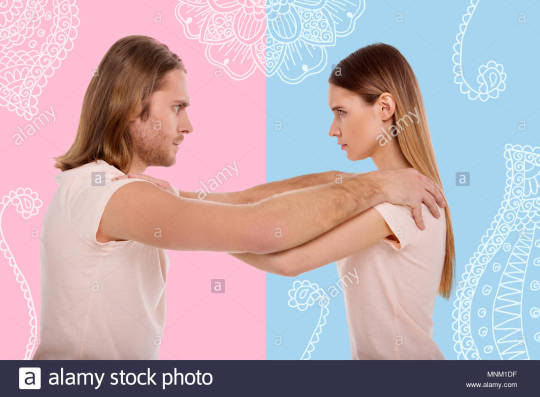
(So imagine that, but minus how aggressive that looks, and minus one of the people’s arms. Also a whole lot less tense/intense.) (Anyway. Moving on.)
-at “thou shalt find a dearer father in my love” (...cue me googling “how on earth do fathers show affection?” Because I really want to get the point across that edmund’s like “a father figure??? For me???” And Cornwall’s like “👍. A father figure. For you.”) HECK I GOT IT. Hear me out. Cornwall pats Edmund on the head (in like, a fatherly way), and with the other hand hold The Letter (TM) (even though this is a different “the letter”) and looks it over. This is the first time he looked away from Edmund since this conversation started. In a way that portrays “yes you are my son now I have claimed you as my own” but also “you are not necessarily my top priority- I can give you the fatherly love and affection you desire, but it’s not exactly unconditional. You did well today, good job! You keep up the good work and I’ll keep up my end of this; ie providing you with the fatherly love you never received in your childhood” ( @suits-of-woe I am trying here. I am struggling. I’m so sorry for ruining the Cornwall Theory like this- I’m trying my best to convey it via my amazing stage directions, but I can see pretty clearly that I’m epically failing at this).
ACT 3 SCENE 7
-Cornwall walks onto the stage first, followed by Goneril and Regan close behind them, and Edmund last.
-at “Farewell, sweet lord, and sister”, Cornwall nods at Goneril in response (this has nothing to do with Edmund, I always just thought it was weird that he doesn’t respond)
- at “Edmund,.. farewell” Goneril had already left the stage, Regan is standing next to Cornwall at the opposite end of the stage. Edmund’s about to exit when Cornwall says “Edmund”. He turns around- expecting Cornwall to say something more to him or something. There’s a pause. Cornwall doesn’t have anything else to say. He just says “Farewell”. Edmund nods and leaves the stage.
ACT 4 SCENE 2
-oh heck I gotta stage an Edmund and Goneril scene now
-I don’t wanna?
(Future Edette Editing: and so I won’t!! I don’t normally describe things as cringe, but that’s what this was. I only put this in because I felt obligated to talk about every scene. Oh well- I guess 4.2 isn’t getting stage directions from me)
ACT 5 SCENE 1
-Edmund enters first, dressed in some sort of military commander uniform. Because. Like. There’s a war going on. His sleeves are rolled up/cuffed up to elbow length, and his arm is still bandaged from when he stabbed it.
-there is a tent with a desk in it on stage. Hold on let me illustrate this:
(Future Edette Editing: yeah there was an illustration here, but I’m changing some stuff so I deleted it)
It’s all on wheels so it can be moved around the stage- whichever piece is the most important to the scene will be more up front.
-Edmund stands at the desk which has some military plans of some sort on it.
-Edmund is armed with a brand new sword (Cornwall’s sword? Maybe? Who knows?) (UPDATE: yeah hi future Edette here- I decided that it is, in fact, Cornwall’s sword)
-With Regan, Edmund also doesn’t get that she’s flirting with him right away.
-and then. Then he’s like “OH WAIT” “WAIT SHE’S FLIRTING” “WAIT SO I GOT 2 GIRLFRIENDS??” “OH WOW THIS IS FANTASTIC” “THIS IS LITERALLY THE BEST WEEK OF MY LIFE” (lol Edmund it’s also the last week of your life)
-he 100% realized at “No, by mine honor, madam”.
-Albany stands at the opposite end of the desk. He never moves any closer or further from Edmund than the opposite end of the desk. Goneril would have moved closer but Albany is blocking her.
-as Edmund leaves he puts on his military commander hat of some sort and adjusts it while looking in a mirror or some other reflective surface. Just to show he’s still the same Edmund from act one- he still cares about his appearance to an extent.
-at “the enemy’s in view, draw up your powers.” Edmund half-jogs in back onto the stage- showing that he wasn’t just commanding the soldiers ( if he was he’d have been walking at a moderate pace), but he was actually with them, to some extent, fighting along side them on the battlefield.
- (Future Edette Editing here: yeah so I deleted the notes on the soliloquy here. I didn’t like them. Oh well.)
ACT 5 SCENE 3
-wow it’s hard to make this Edmund guy redeemable/sympathetic when he kills off Cordelia. Like. He really didn’t need to do that
-why, Edmund. Why must you do this.
-you’re making my job here (ie to make you sympathetic) very difficult.
-ANYWAY. I’ll do what I can for this scene
-The captain here? Yeah, he’s Curan from earlier. Edmund made him a captain. There you have it, Edmund’s one semi-redeeming factor for this scene
-I really don’t know how to have this part play out in a way that makes the audience sympathize with Edmund. This is the best I can do.
(Future Edette Editing: yeah so honestly killing off Cordelia and Lear was a logical and strategic move to make, tbh. ((Not morally fantastic. But logical.)) Because yeah Albany would have left them alive and then what? They’d get the throne? Let’s be real here- the country’s already collapsing- the last thing you need is Lear or Cordelia on the throne. Even *Albany* would do a better job than either of them. And he wouldn’t do anything at all. So. Yeah.)
-I’m so burnt out right now I know this isn’t the quality content you came here for but I don’t know how to get this back on track either. ANYWAY I am dedicated to finishing this. Let’s go! There isn’t much left to the play! I’m almost done!
-at “Sir, by your patience, I hold you but a subject of war..” Albany speaks in a very harsh tone- talking to Edmund as if he were a child who interrupted class for like the eighth time that day. Albany’s just salty that his wife likes Edmund more than him.
(Future Edette Editing: Sorry if this doesn’t flow well here anymore- I deleted a bunch of stuff)
-as the argument continues, Regan and Goneril get more frantic because they see they’re not winning.
-Albany gets louder and angrier because he’s frustrated that his wife likes Edmund more than she likes him. Also because at this point, he pretty much hates Edmund.
-Edmund, however, is the quietest out of all the yelling people around him. He doesn’t like arguments- or rather, he doesn’t like when he’s the one the argument is directed towards. He tries to stay calm and talk in a level voice. As everyone around him argues he tries to step in between them and silently play the role of peacekeeper.
-at “Nor in thine, my lord” Edmund is still calm./ not yelling at him. He says it like he’s stating a fact, not contributing to the argument.
-at “half blooded fellow, yes!” My book’s translation to modern english say “Bastard, it is!”. And like. No one’s called him a bastard for like 4 whole acts now. All I have to say to this is Big Oof. (Is that a dead meme? Yeah. Probably.) Edmund is surprised at first- then glares at him- in a way saying “oh? You want to go there? We can go there. I’ll gladly fight you with my own two hands.”
-at “I will mainly my truth and honor” he draws his sword, which I have now decided definitely is Cornwall’s sword. Why does he have it? Idk, Regan probably gave it to him.
-As Edgar and Albany talk before the fight, Edmund swings his sword at nothing in particular- the way you’d see people warming up for a fight. This sword is not a two handed sword, so he’ll be fine even with his stabbed arm. As I mentioned earlier, he stabbed his non-dominant arm, so his sword arm is fine.
-at “In wisdom I should ask thy name..” he does something to indicate that he might know it’s Edgar. What does he do? I don’t know. Something with a whole lot of ✨symbolism✨. I’ll figure it out before posting this. Or maybe I won’t. (Future Edette Editing: Yeah so I figured out what to do here slightly after, and I have a whole post about it- but to sum it up, he looks at the *mysterious masked man*’s sword (which as you may recall was his). And he’s like “oh. Oh. Ok then.”)
-they fight. Edgar (as I previously mentioned) is using the sword Edmund gave him at the beginning. Edmund is using Cornwall’s sword.
-As they fight it’s clear that they’re pretty evenly matched. (I mean. Then again, Edmund was just helping in battle like two seconds ago while Edgar was just chilling with his half dead/dead father. So. Edmund’s trying to win a duel after just doing a bunch of exhausting physical activity while Edgar is not.) (Edmund would win if they were fighting when they were both at their strongest)
-(I’ve mentioned this in a previous post, but I’m gonna restate it so that you don’t mess up on how you imagine the fight going down. There’s only one valid interpretation of it, and it’s my own interpretation. That has literally never been used in any production. Yup. That’s the only valid way to imagine the duel.) ANYWAY. As they fight, Edmund seems to be about to win, when Edgar hits his already stabbed arm. Edmund loses focus in that one moment, because. Like. That’s painful. (I was gonna say he drops his sword, but does he? Does that work? I don’t know. If he does or doesn’t, it’s valid either way). Then Edgar stabs him. With is kinda even more painful, and somewhat fatal.
-After he’s stabbed, some random soldier brings him to the tent toward the back of the stage, where he stays until he’s brought off stage
Here’s an illustration to help you picture this:
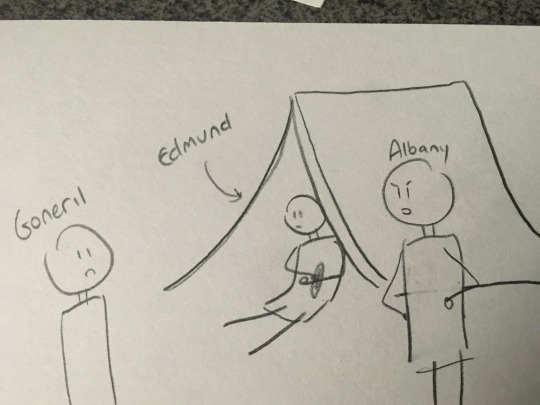
-Edmund is more focused on his wound than the conversation. His tone and body language for the rest of the play conveys “You won! I lost! I’m sorry! Can I get medical attention now??”
-Headcanon that Edmund would have lived if he would have gotten some medical attention sooner
-at “yet Edmund was beloved” he does a little sarcastic laugh (not like a laugh laugh, more like a cynical nose exhale?)- he sees the irony of how all three of them trying to take their rightful power, and all dying at the same time as a result of it.
-while Edmund tells them they still have time to save Cordelia, he sinks down/lies down. He already accepted the fact that he’s going to die.
-while he’s delivering this news, Edgar and Albany look at him in shock and then at each other. From there to the rest of the scene, no one looks at Edmund again. Not because they don’t like him, just because they find him irrelevant now (which Albany outright states a few lines from here).
-When Albany tells the soldiers to take Edmund off the satge/away from there, he doesn’t look at Edmund, he just vaguely motions to him.
-At “Edmund is dead, my lord” “That’s but a trifle here”, Albany barely turns to look at the messenger. He doesn’t care that Edmund is dead. No one does. The wheel has come full circle. No one cared about Edmund at the start, and he’s just as irrelevant now. Edmund wanted to be something to people. He would have wanted them to react to his death. If they had celebrated it, he would have been happier than if they ignored it. He doesn’t even get that much.
-The Curtains Close. The Play Is Over-
#king lear#shakespeare#Do you know how many HOURS went into this??#...because I don’t#I genuinely have no idea how many hours went into this#I was studying for midterms at the same time as writing this#so the hours spent on this and this alone were probably around 5?#5 hours sounds legit
68 notes
·
View notes
Text
Game of Thrones - Jaime Lannister
A rambling character study of Jaime Lannister from Game of Thrones.
Introduction
Ok, so nearly a month since I finished watching Game of Thrones, and I’m still not over how it ended. Like some things I can reconcile myself too, some things just annoy me when I overthink what happened and some things - ok one thing in particular - is just not letting me go.
And that is the way the show ended for Jaime Lannister.
I know I’m like 2 years too late on the GoT bandwagon and no one cares anymore. But I’m writing all these posts because I still care, having recently experienced what you all went through 2 years ago. And I know what I’ll be posting will have all been posted countless times before and discussed in the fandom years ago. But I kinda need to still get my own thoughts written down and outta my head.
Before I go on though, I just want to add in here that I do still love this show and, even right to the very end, think the acting, crew, music, sets/scenery, costumes, basically everything was pretty much amazing. That is except the writing, which, went downhill after series 4. Before then it was pretty much amazing too (not always perfect (is anything?), but so darn good!)
Now, turns out when I came to write down my thoughts on Jaime’s ending, I had even more than I realised. Basically it’s turned into me writing one massive analysis of Jaime’s character based on the show. So I’ve split it into separate posts, with this first one more of an intro, a summary of my thoughts and overall opinion on Jaime and a bit of context on my own experience with Game of Thrones.
Now, spoilers for Game of Thrones ending
I’ve read/watched a lot on the internet since I saw those episodes (series 8, episode 4 and 5 in case you weren’t sure) and I know a lot of people don’t like how they ended Jaime’s story in the show either. But I’ve also read a lot of comments where people did like it, or at least thought it made sense. The reasons they give make no sense to me, but it’s made me think and overthink and analyse way too much about how they did end his story.
So, in order to try and get them out of my head, I’m putting them down here. It’s a long, pretty rambling read, split up into a few parts because it got so long. Across the posts I’m going to go through my own understanding and perception of Jaime’s character and his arc and why I think they completely ruined it in episodes 8.04 and 8.05. I’ll then focus on some of the main reasons I’ve seen why people think it did make sense, and why (even though I maintain everyone is entitled to their own opinion) I completely disagree. Jaime’s character arc was annihilated in the show even more than Kings Landing. And that is more than a bit frustrating.
Now, just a bit of background to add some context to my thoughts; I basically only got around to watching the show a few months ago (I’ve not read the books yet). I basically binged watched the entire show and am now just a little bit reeling from it all! LOL! Also, as I did binge watch it, it meant I didn’t spend time between episodes/series really analysing/theorising etc. I had a few ideas and thoughts, but not to the depth it would have been had I needed to wait impatiently for each new episode. This means I think my viewpoint is of the show as an overall whole, rather than each separate series, because it kinda all rolled into one. This may, or may not, have affected my opinion and so this analysis of Jaime Lannister and my disappointment in his ending. It also means, having only watched the show once, I’ve probably forgotten or missed bits. However, since I finished the show, I’ve watched a lot of YouTube videos and read a lot of stuff on the net about it, including in comparison to the books. (And I maybe rewatched some of my favourite scenes just a few times…) And now I am analysing and theorising and thinking about this show way too much! LOL!
So I guess my viewpoint isn’t one of ignorance, but it might not be quite the same as someone who’s been invested in the show from the start.
Like most viewers, I pretty much thought Jaime = evil villain for most of the earlier series. He had the odd moment, but it wasn’t until he did that speech with Catelyn about the conflict of all those oaths he’d taken that I even started to take note of his character. And then series 3 happens, where he has his road trip with Brienne, loses his hand, saves her from a bear and basically starts his wonderful path of character development. And basically manages to go from a guy I pretty much do not like at all at the start, to one of my all time favourite characters ever.
Also, I’m definitely a Brienne/Jaime shipper and did wish them to have a happy ending. However, I pretty much never thought the show would actually even go there, let alone make it happy. In fact, I actually did my best to NOT ship them for such a long time because, being Game of Thrones, I knew it was very unlikely to end well. But, then yeah, their intense staring contests kept on happening and darn it, the way that Jaime’s voice breaks when he says Lady Brienne and him giving her a priceless sword, and what the sword represents and…
Ok, well, yeah, I could gush about them all day, but anyway, I ended up not being able to fight the ship any more after series 6 and THAT tent scene. But, even then, I still didn’t think the show would make it canon, like it would just leave it all open ended/make up your own mind kinda thing.
And then we get to series 8. Like we have a whole episode (that is actually named for their very storyline) with Jaime just staring at Brienne, being all dorky around Brienne and then, if that wasn’t enough, he even KNIGHTS Brienne! I mean, this is epic for this ship! And I would have been ok (not happy, but satisfied) as a Brienne and Jaime shipper if that had been it.
But then no, then he barely leaves her side in the fight against the dead in the next episode – they fight side by side with their two halves of one whole swords, each risking their own life for the other multiple times. And then in the next episode (where I don’t think there’s barely any scene where they’re NOT right next to each other) the show DID make it canon. Like it actually did go there, they slept together (in an adorably awkward scene I love). Heck, Jaime then even chooses to stay in the North and be with Brienne, even though he hates the North. Like this was just epicness of all proportions and I got so excited and all those shippy feels I was trying to hold back just came rushing out and then... and then...
THEN that scene happens. He leaves her. Like WTH…
Anyway, more on that in another post. I guess what I’m trying to say is that as much as I ship them, my issues with Jaime’s ending is less about his relationship with Brienne, and more just his complete 180 on character development. Jaime’s arc has been heavily influenced by Brienne, but it is still amazing in its own right. As I didn’t expect Brienne/Jaime to ever happen (so when it did and then got taken away in the very same episode, it’s incredibly frustrating and gives even less credence to what does happen), it’s not why I’m so annoyed and disappointed with what happened to Jaime.
I’m annoyed because they took all this amazing character growth over 7 series and then screwed it all over in less than two episodes. No, that’s not enough. It was a complete and utter character assassination that completely undermines and destroys 7 series worth of investment and development, completely nullifying everything Jaime went through as a character.
So, yeah, I’m a bit annoyed, but that’s because it makes no sense and it’s bugging me enough to write this whole series of posts. Because I can’t let it go. And having read people justify, even like it online, it’s made my inner analysis thought train go into override. And I’m sorry if these posts are like I’m preaching to the choir, or writing such obvious stuff and repeating myself, I’m just trying to get it all out my head as coherently as I can. Hopefully allowing me to move on a bit.
#Urgh #I need to sit in a corner and try to cheer myself up again before I can write anymore #Maybe watching some Brienne and Jaime fan videos will help cheer me up #And also simultaneously depress me even more.
10 notes
·
View notes
Text
why merthur isn't queerbait
aka, the characteristics of queerbait and why merthur doesn't follow them
if you can tell this is going to make you upset, please don't read it, for your own sanity. I'm expressing some personal opinions/analysis and I would hate for you to get needlessly annoyed.
post under the cut.
the characteristics of queerbait
1. gay romantic vibes that never become canon
obviously. this is the umbrella of relationship under which queerbait falls. items 2-4 are characteristics that make it specifically bait, rather than just vibes/chemistry.
2. intent to market to a queer audience
queerbait is, by definition, an intentional (and nefarious) marketing strategy. relationships are baited in order to draw in a queer audience without ever following through and creating real representation, which just leaves everyone dissatisfied.
note that if it's not intentional, it's just... unfortunate. it's often difficult to tell whether a potential pairing is set up intentionally or not, but if it's pretty clear the intent wasn't there, then it's not queerbait. and if it was clearly intentional, then it's queerbait, 100%.
3. similarity to canon romantic relationships
one of the most common ways queerbaiting shows up is through parallels with canon (usually straight) romantic relationships. commonly detected through the test, "if a man and a woman / boy and a girl in this media did the same thing, would it be widely considered romantic?" phrasing, framing, lighting, and costumes can all be a part of this.
4. lack of romantic fulfillment for both of the characters
this is the main one that I wanted to talk about, because it's the main reason why I've found I get annoyed by some non-canon romantic vibes and I'm fine with others. when both characters in the potential romantic relationship are left available or romantically unfulfilled (does not include being single and happy about it), it's frustrating because there's a clear path not being taken in order to heighten tension. it's the same frustration as every will-they-won't-they relationship (think ross and rachel), but worse because they're denying canon queer rep so it's like. come on.
however, when one or both of the characters are romantically fulfilled, it's a statement by the creator(s) that a path has been chosen separate from the potential pairing, and it's the right path for the character(s). it's not leading consumers on; it's giving them a story and letting them decide how they feel about it.
merthur
another reminder that if this is going to make you upset, save yourself while you can.
merthur is commonly identified as queerbaiting and i! humbly disagree! merlin and arthur definitely have chemistry, and it's arguably romantic. however, what about the other characteristics?
intent: as far as I've been able to find on the internet, merthur was never advertised as a romantic relationship. it's consistently described as a "bromance," which does not carry romantic connotations in the mainstream. I can't speak for the showrunners or writers, but in interviews, colin morgan (merlin) and bradley james (arthur) seem to talk about their relationship as purely platonic. I didn't do a super deep dive, so if there's evidence against this, then I stand corrected, but from my knowledge, there was no intent to market merthur towards a queer audience (or any audience).
parallels: this one particularly interests me with merthur. at first glance, merlin and arthur's scenes together are very romantic. they're put in a lot of situations, both comedic and heartfelt, that push them closer and prove the strength of their bond. they are physically close much of the time too. however, when you compare their relationship to canon romantic relationships in the show, you realize that they're actually pretty different. none of the canon romantic relationships are nearly as frenemy-like or comedic, and they're characterized by... well, romantic feelings, rather than feelings like respect or companionship. (while respect and companionship are important in a relationship, merlin places a strong emphasis on Romantic Feelings being their own thing.) merlin and arthur have vulnerable conversations while lying side by side at night, but the canon romantic couples in the show never do. merlin and arthur bring gifts (notably flowers) to the objects of their respective affections, but never to each other. the show presents romance in a very particular way, and it presents merlin and arthur's relationship differently.
romantic fulfillment: and then, of course, there's gwen! gwen and arthur have a long-term, deeply developed romantic relationship, stemming from bbc merlin Romantic Feelings, in which they lean on each other and satisfy each other's need for romantic companionship. merlin does not have a long-term romantic relationship, but that's never presented as something he needs to be happy with his life.
tl;dr: merthur isn't queerbait but they still got hella vibes so go off
19 notes
·
View notes
Text
Shadow and Bone Netflix Show - Brief Analysis
In this post I am going to break down the things I liked, the things I did not like, and just a general overview of my thoughts on the Shadow and Bone Netflix show. This is coming from someone who has read the Shadow and Bone trilogy about three years ago, the Six of Crows duology about a year ago, and has just recently watched the show when it premiered. I am a big fan of the duology and I did find the trilogy decently enjoyable at the time that I read it.
I would like to preface this by saying that, as this is an overview, I will not be going into a lot of detail with regards to every scene. I may do something like that in future posts where I discuss each scene or character separately but this is more of a general overview. I would also like to clarify that I will not be addressing anything super in depth about the racism in the show as I am not very educated on the topic. I know that a lot of people have many different views on it and as someone who is Asian, my personal view is that it was fine. Some pieces of dialogue would occasionally feel a little forced but I personally do not believe it was a bad idea to make Alina a mixed race character. I know sometimes it can really feel like the producers and writers are trying to be diverse by adding POC to the cast and having the character face some form of discrimination every other scene but this show did not feel like it was pushing it super hard. There was so much else going on in the show that I did not mind those few scenes where they did address racism.
So this is going to be divided into three parts. The first is production quality. The second is casting, acting, and character portrayals. And third is the writing and storytelling. So now let’s get into it.
Production quality:
This was one of the biggest things I feared would be terrible about the show and would greatly impact my opinion of it because in a visual medium it is very difficult to get past bad visual effects, sets, etc. I knew it would be the first thing I would notice upon starting the show and I was very pleasantly surprised to see that money was clearly spent in the production with the incredible effects, costumes, props, set designs, and cinematography. I will say I am not educated on the subject of filmmaking and cinematography but from the little I do understand I think it was done very well.
There were also certain aspects I noticed when comparing the filming of scenes between the two storylines. Mal and Alina’s scenes such as when they are writing letters to each other or when we get flashbacks of them at the orphanage, are more slow and soothing almost like gentle waves swaying back and forth on a beach. Their voices and dialogue are also soft and warm and this really gives a good sense of their relationship and dynamic. In contrast, when you look at scenes involving the crows, the filming is a lot quicker and snappier and things are generally more fast paced. Their dialogue, which involves a lot of banter or back and forths, is also great in showing their dynamic as well as their own individual character.
Moving on to set designs and costumes, I think these were done really well. The throne room of the Little Palace was almost exactly as I had imagined it to look and the palace in general with the rooms and hallways did appear to be high quality. The Fold was also very well done though something I found a little strange was the occasional bursts of lightning in the sky. I think that sort of defeats the purpose of it being this completely dark place. Other than that it was exactly as I would imagine it to look. Ketterdam was also exactly as I imagined it to be with the dark alleys and dingy streets. With regards to the costumes, I think they were beautiful. Alina’s costumes in particular were really well done. I loved the way they did her hair and make up in certain scenes like when they go through the Fold that last time. The Keftas that the Grisha wore were incredible and accurate to the books with the different colours of each for the different kinds of Grisha. The crows’ costumes were also exactly what I imagined each of them to look like and felt really connected to their characters. Overall I think the set designs and costumes were fantastic.
All in all I would give production a 9.5/10.
2. Casting, acting, and character portrayals:
Casting was also one of my fears for this show since the characters for me are the most important part of any story and if the cast is not good then the characters will not come across in the best way possible. I was once again so pleasantly surprised with the actors and actresses chosen for each role. I was worried about cringy acting as well and I am so glad there was no point at which I was cringing at any of the acting. The actors all appeared to have great chemistry and it came across wonderfully on screen. I’m going to briefly go through each of the main characters and the actor or actress that plays them and my thoughts on the acting and character portrayals alone. Later in the thrid section of this long post I will talk about each character with regards to how they were written.
Alina: I personally believe Jessie Mei Li played a perfect Alina Starkov. She really gave off the vibe of being this important figure, a Sun Summoner, without it feeling annoying or as though she knows she is the main character of the story. I think her acting and expressions were generally well done.
Mal: Though Archie Renaux was not how I imagined Mal to look, I think he did a great job of portraying the character. His interactions with Jessie Mei Li also felt very natural and they definitely had good chemistry.
Darkling: Again, I think Ben Barnes was the perfect casting for the Darkling and his portrayal of the character was very well done. There were times where he would get teary eyed when talking to Alina and I understand that it was part of his character in being manipulative but it looked just a bit weird because crying is just something that almost humanizes him which I think does not fit with the idea and aesthetic of his character. You can still have him be manipulative and appear a victim to Alina without him crying or getting teary eyed. I think he would be able to get that across better with a tragic expression and tone of voice. But overall I think he made a great Darkling.
Kaz: Once again perfect casting with Freddy Carter. And really for this one, props to the directors and others who cast him for this role because this was a diffcult character to get the perfect casting for. Kaz’s character is probably the one that I have the biggest problem with but that has more to do with the writing aspect of his character. With regards to the casting and acting, I think Freddy Carter was amazing. First of all, he looks exactly as I would imagine Kaz to look. Second, his expressions and mannerisms were on point. And third, he had really good chemistry with Amita Suman (Inej) and Kit Young (Jesper).
Inej: I feel like I keep repeating myself but once again I think this casting was perfect. Amita Suman as Inej just felt very right. Her portrayal of the character was amazing, she looked just as I imagined Inej would, and her chemistry with the other actors was incredible.
Jesper: Once again great casting with Kit Young as Jesper. He got across that charisma and humour that Jesper is known for extremely well through his expressions and body language. He also appeared to have great chemistry with the rest of the cast.
Nina: Another great choice to cast Danielle Galligan as Nina. I think she captured Nina’s energy or “vibe” perfectly with her voice and body language.
Matthias: Calahan Skogman is exactly as I pictured Matthias to look so I think he was a great choice as well.
Overall I think the casting, acting, and character portrayals in this show were spectacular so I would give it a 10/10.
3. Writing and storytelling/ How it was as an adaptation:
This is, in my opinion, the section with the most issues even though they were very few.
Overall I think the writing was great. There were a few cliche pieces of a dialogue but those were very few. The dialogue for each of the characters felt natural and never felt out of character. As I mentioned previously, Mal and Alina’s dialogue had a warmth to it and their dynamic of childhood best friends came across really well through their dialogue. It did not feel as though they were trying really hard to have that dynamic. I also think it was a great decision to have the letters they wrote to each other be narration for many of the scenes that we saw them in. This was a great method of really getting across what they were feeling while they were apart and allowing the viewer to empathize with them. On the other hand a similar sort of technique was used with the crows. Whenever they were carrying out some sort of heist or mission, Kaz would be narrating the plan while we were watching it physically play out on screen. The dialogue between the crows was generally good and mostly in character. Their dynamic came across really well in a lot of their banter.
With regards to the storytelling and as an adaptation, I also think the show did a pretty great job. Alina’s storyline was coherent and had a logical progression from beginning to end, following the major plot beats of the book. The main issue I have with it is that it felt rushed. I think adding an episode or two may really have helped with the pacing. It felt as though Alina learns about her powers and is taken to the Little Palace where she’s conflicted for maybe an episode and then suddenly she feels at home and like she belongs. We barely get to see her training at the Little Palace with Baghra or Botkin or see the development of her friendships with Marie and Nadia as well as with Genya. That part of her arc, which was a major part of it, felt rushed. Other than that I think the show did a good job of getting her from point A to B in a cohesive way.
The crows storyline, I thought, was incredible because, since I am a big fan of the duology, I loved getting to see the crows and how they were before the events of Six of Crows. I think it was fun seeing their lives in Ketterdam and the way they worked before Nina, Matthias, or Wylan joined them. I was worried about how they would be incorporated in the story and that it would not feel natural but I think the decision to make their goal be to get Alina was a great way to tie them into the main storyline. It made sense with their characters that they would do something like that to get money and it made Alina’s storyline even more interesting. Getting to see interactions between the characters of both the trilogy and duology was one of the best parts of the show for me. Think about it. These were interactions we could only have hoped to see in the books and the show brought that to life and gave us those interactions. The crows’ storyline did feel a little less cohesive than Alina’s but this also made sense with their characters and the mission they had to carry out. There were many parts of the plan that needed to be completed, different heists and side missions, in order for them to reach their end goal which was kidnapping Alina from the Little Palace so it made sense that their storyline was a little less straightforward. Overall I think they had a very interesting and captivating story.
As an adaptation I think the show did quite well. Further down in this post I am going to discuss the major issues I had with the show as part of this section where I am discussing writing, storytelling, and the show as an adaptation. But in general I think the show did well in adapting the characters as well as Alina’s storyline. The crows’ storyline was obviously something that was not taken from the books but something that I could definitely see them doing. I think the show also did a great job of adapting the world and all of its intricacies as well as giving off that atmosphere that you get a sense of when reading the books. I also liked that there were many pieces of dialogue taken straight from the books which really made the characters of the show feel exactly like those of the book.
Okay, now breaking down the few issues I had:
Kaz’s character: I think if we look at Kaz in the books, we can break his character down into two parts, the two defining parts:
His intelligence, wit, and strategic mind.
His cruel and brutal nature.
I think the show got both of these wrong on different levels. One of these can be explained while the other cannot. In the show, Kaz is not nearly as intelligent or strategic as he is shown to be in the books. We see on a number of occasions in the show that he has been taken advantage of or that he is not in the upperhand of a situation. I think that is a major change from his character in the book where one of the things you remembered about Kaz was how he was always ten steps ahead of his opponent. But this is an issue that can be explained and given depth by considering that the crows’ storyline in the show takes place prior to the events of Six of Crows and that at this point in time, Kaz hasn’t become that quick-witted, mastermind, strategist we know him to be in the books. We can see the beginnings of that character in the way he is portrayed in the show and can understand that his natural progression would be to the character from the books in the aspect of his intelligence. On the other hand however, there is still the second major part of his character and that part is a little bit of a bigger problem. That has to do with his completely cruel and brutal nature from the books. This was one of his major defining features and was very strongly rooted in his backstory. It was his past with Pekka Rollins and the death of his brother Jordie that brought about this ruthlessness in him. And what made his character so interesting and dynamic was how he was very slowly becoming a more caring person. It was a very slow progression but it was there nonetheless. You could see it in the way he cared for Inej and the rest of the crew. By the end he was still no where near being a gentleman, but there was still a change in him from the beginning to end. This is where I think the show messed up a little and it is an issue that I don’t really think can be resolved. The show made Kaz more soft and kind in nature. He definitely wasn’t entirely nice but you could tell he was a lot nicer compared to his book counterpart. Certain scenes in which he is talking to Inej felt a little too soft in particular the scene in which it almost seems as though he is about to confess something to her when she rushes out of the room and he calls after her. I don’t imagine book Kaz would ever do that. Or when he tells her that no one is like her. These are all moments where he appears to be much softer compared to the Kaz in the books that was cold and cruel. This is also an issue that cannot really be fixed in future seasons because the natural progression for the show then would be that he gets softer then he already is which means we will not get to see the Kaz from the books at all or with any accuracy. If future seasons do make him exactly as he is in the duology then there will be the issue of it not feeling consistent with the character he was made to be in the shows. However I will end off by saying that even despite his character not being entirely accurate to that of the books, I still very much enjoyed watching every scene he was in and this issue did not ruin the overall experience of the show for me. I think what they did with his character still worked really well with the story, so overall it was not a major issue for me in changing my opinion of the show.
Nina telling Matthias why she got him imprisoned as a slaver: This I find to be a greater problem that could have so easily been fixed by taking out just a few pieces of dialogue. I think a big part of what made Nina and Matthias’ story so heartbreaking was this pivotal moment when Nina turns him in as a slaver to save his life. And he doesn’t learn the truth until they reunite in the present day of Six of Crows. He spends that time in Hellgate believing that she betrayed him and that she really was the deceitful and dishonest witch he believed her and all other Grisha to be. Then when he finally does learn the truth, it is this big moment and then he has a slow progression to eventually believing it. The show eliminated the entire part of what made their story so tragic by having Nina tell him the truth of what happened immediately after she has him captured. So there is no possibility of this slow journey that Matthias has of accepting that truth. In the show he almost seems mean now for not believing or at least trying to believe what Nina tells him. Overall this is probably one of my biggest gripes with the whole show.
The Darkling creating the Fold: Another issue that could quite easily have been fixed is how the Darkling created the fold. The show made it to be that he came across a small slip of paper, he read what was on it, and then he gained the ability to create the Fold. That is too simple of an explanation for how something as grand as the Shadow Fold was created. I think this could have rather easily have been fixed so that even if it was still easy it wouldn’t be as easy as just happening upon a slip of paper. They could have done it by showing a montage of him looking through all the books in the archive and figuring out that there is some sort of code that he needed to put together and when he does piece it together and perform some sort of ritual, then he gains this ability to create the Fold. That would have made it more believable and the scene would only have been slightly longer than what it was in the show.
Crows letting Alina escape: This was another issue I had that sort of adds to how they changed Kaz’s character because book Kaz would never have allowed Alina to escape so easily. Even the Kaz in the show would not have been outsmarted by Alina. This was one thing that felt a little out of character for the crows because, fine, I can understand that Alina blinded them for those few seconds with her light and Inej was not in on the plan of capturing her anymore, but how was Alina able to run out of sight so fast that neither Kaz nor Jesper saw where she went. Then on top of that, they aren’t discreet about finding her, as Kaz is always careful to be. Instead they go around the streets describing how she looks and asking people if they’ve seen her. I am not entirely sure what they could have done to solve this issue but I don’t believe the solution was very difficult. Maybe they could have explained through a short piece of dialogue that Alina used her power in a way that blinded them for more than thirty seconds which gave Alina enough time to get out of sight. Whatever the reason, I think this should not have been an issue because, despite seeming small, I think it says a lot about the crows’ characters. And I definitely don’t think this was a bad scene at all because I loved seeing this interaction and seeing Inej’s reaction to Alina. I just think the issue of Alina escaping so easily should have been addressed.
For now, after watching the show just once, those were the major issues in writing and storytelling that I had with the show. If I have more thoughts about this after watching it again, I will make another post about it. Now I want to talk about some things that the show added that were not in the books and what was changed or kept from the books, that I liked.
Mal’s character: The change that was made to Mal’s character in the show was probably the biggest and best change that could have been made. One of the major reasons I do not like the Shadow and Bone trilogy anywhere near as much as the Six of Crows duology is the characters. Sure, I found the world and plot interesting when I read the trilogy a few years back and even at times the characters were good, but a lot of the time I was either annoyed with Alina or with Mal. Most of the time it was Mal because he didn’t really feel like he was a great friend to Alina because of the way he treated her for being Grisha. I think a lot of my frustration with him also came from the story being entirely in Alina’s perspective so we never got to see any of what Mal was going through. The times that we did see him, he was either angry at or overly protective of Alina and there were only few occasions where he was being a good friend. The show really changed that with allowing us to see his perspective and all the difficulty and trauma he was going through to be with Alina. The show succeeded in making him an empathetic character and I think that is one of the most necessary things in creating a likeable character. Through his dialogue and actions, we were able to see how much he really cared for Alina. There were never any long stretches of time where he was angry with her or, on the other hand, where he was being overly protective of her. He was continuously being a good and supportive friend and that made the biggest difference in my liking his character. It is also what made me really enjoy Alina’s storyline as well because there was no point at which I found either Alina or Mal or any other character involved in their story, annoying to watch.
No mourners no funerals: I was overjoyed when this line came up in the show because it is such an iconic line from the duology that I absolutely love and it was great to see it said on screen. Similarly, I was so glad that we also got to see Kaz say the line, “The deal is the deal.” and say it to Alina.
Interactions between S&B and SoC characters: This was probably one of my favourite things about the show. It really felt like watching two worlds collide. I loved watching Kaz and Inej posing as guards and trying to escort Alina so they can take her. Watching Inej’s reactions to Alina was one of the best things. Then, Mal teaming up with the crows when they are in the Fold was one of the strangest but coolest interactions. Alina giving Inej the knife that she later names Sankta Alina was one of the best interactions I could have hoped for with the crossing of these two casts of characters. And to end it with Alina giving Kaz that valuable piece of jewelry, an interaction I never thought I would see, was incredible.
Conductor: The addition of this character I think was a great idea. He definitely added to the storyline of the crows and was an interesting character on his own. He was the cause of a lot of the funniest dialogue and moments in the show like when the crows are crossing the fold for the first time. Overall, I think it was a good decision to add him in.
Now last but not least, the thing that stole the show and beat everything else by far was:
(Drum roll)
Milo the goat!
And with nothing more to say about that, we’ve reached the conclusion of this very long post. My overall rating for this third and last section, which is regarding the writing and storytelling, would be an 8.5/10, a very good score.
If I were to rate the show over all, I would give it a 9.3/10 because I think it was spectacular in many aspects. The few gripes I did have were not anything too major, though if those aspects were fixed I think this would be a top-tier show and adaptation for me.
What do you think about everything that I said? Do you agree or disagree? I’d love to have a discussion so feel free to reach out and comment!
#shadow and bone netflix#shadow and bone#six of crows#inej#kaz#jesper#mal#darkling#shadow and bone netflix show analysis#analysis#nina zenik#alina starvok#mal oretsev#jesper fahey#kaz brekker#inej ghafa#crooked kingdom#grishaverse#grishaverse netflix#netflix
13 notes
·
View notes
Text
BNHA FIC PROMPTS
A collection of all of the fic ideas from that ask game, as of now. I’ll throw in new ones if i get any and when I remember. Feel free to use any of them, I’d love a link if you did!
with hands to the sky, I beg (what will save us?)
Izuku is a god who asks to be reborn as a human to try and help. He is warned he can’t return to being a god and will join the mortal realm, ever reincarnated. He agrees.
Izuku is a child with faint memories of a life he never lived, who knows too much about the world but not enough about the people around him. He’s not listed as having a quirk but he’s never gotten sick, never been hurt. He scares the other children and the adults don’t like his precocious nature. Inko loves her little miracle.
My Soul is Like a Supernova
Things happen around Izuku. Always have. Everything from earthquakes and villain attacks to miraculous healing and lottery wins. He’s always attracted big events like this - as if even the universe can see how important he is and it warps itself around him.
He sees this as perfectly normal. 1A is begining to notice a stressful pattern.
This one regret of mine
Character study of Inko and how she deeply regrets so many things she’s done in her life, from her husband, to giving up on her carrier, to telling Izuku he couldn’t be a hero and then letting him keep going to UA.
But no matter what she’d never regret her son.
Of souls and lost causes
A good ol’ Izuku sees dead people AU, focused more on his younger years when he’d wander around the city helping as many spirits as he could, only to return home at the end of the day exhausted and dirty to an increasingly worried mother who believed the doctor when he said seeing ghosts as a quirk would be impossible.
my life.your choice
Underground heroics AU (i dont think ive ever posted that au huh): Izuku is the well-known son of japan’s immortal emperor, All for One. Born quirkless, he’s been emotionally abused but violently protected his whole life by his father, his mother killed before his eyes for trying to take him away. He’s never been able to make a choice for himself save for his bodyguard - his childhood friend, Bakugo Katsuki.
Katsuki made a pledge to protect him when they were in kindergarten and he’ll be damned if he breaks it now. And if it takes the two of them joining the resistance, meeting a vigilante by the name of All Might thought long dead and Izuku receiving a near-mythical quirk? Well, that just makes it more exciting, doesn’t it?
I forgot that you existed
Izuku gets hit with a quirk that not only makes people forget him, it prevents them from seeing him as well - all but erasing him from reality for everyone he knows. He can still interact with things but all it manages to do is just UA shut down under fear of villain infiltration. They find Izuku 18 hours later when the quirk wears off - a motion tracking gun trained on his forehead.
certain uncertainties
No one can predict the quirks trapped in One for All or when they’ll show up. Anthology fic of Izuku discovering each of them, some being rather helpful, and at least one piece of merch being sent into a low orbit.
Sometimes goodbye is a second chance
Set in the same universe I wrote console reset in; during the two heroes movie: they never defeat Nine and he slaughters the whole island and his class, leaving Izuku till last. He comes back at the start of their first day on the island and doggedly makes friends with every islander he can because while it hurt seeming them die, it hurt even more knowing he’d never even learnt most of their names.
They win this time the first time they meet him, even if it’s a marathon fight of 8 hours with him and Bakugo doggedly wearing him down. No one dies. Izuku thinks it’s worth dying as many times as he has to to keep the people he loves smiling.
The immortality of the heroic spirit
One of the quirks in One for All is determination: if you have something you desperately want to do, you can’t die - no matter how much blood you lose or home many pieces your body is crushed into - you’ll just heal back to where you were before you died. All Might and Aizawa find this out to horrifying effect during a brutal villain fight they are stuck watching on the news with the rest of a terrified UA.
In hindsight this makes a lot of sense to Izuku. Aizawa wants to scream. All Might has coughed up more blood than is probably healthy and all of 1A bruised hands from where they were clutching each other’s when it got too tense.
Shine on you invincible legacy
Izuku becomes a top 10 hero before hes even out of high school, hitting No.2 the second he graduates and taking No.1 from Hawks literally the next time the ranking is counted. 1A will not stop throwing him parties each time he moves up in the ranking, even if in 3rd year it was every other week. All Might comes to ever one of them.
Shake the Dirt from Your Shoes
Izuku will be a hero and no one will stop him - an AU a fair bit like the beginning of canon except Izuku fights back, remains unending optimistic and maybe engages in a light bit of technically legal vigilantism, accidentally befriending a vast array of heroes and a student or two.
To his horror, they recognise him out of costume as soon as he speaks to them, resulting in a very eventful first day at UA.
do you feel with a heart of steel
Original Sin AU, young Izuku finding feeling emotions difficult and not knowing why. He finds a dying animal on the way home and sits with it, patting it until it passes away. He doesn’t think he feels anything, but his cheeks feel wet.
all you want is milk and honey
Villains have been trying to use Izuku his entire life, much to his annoyance and confusion (I wonder who in his family might make him known to villains? hm). He’s gotten very good at being intimidating, even as a child.
When he gets kidnapped with Bakugo on a primary school field trip he decides to hell with it and breaks out all the stops. Turns out villains don’t tend to want a 10-year-old who can describe in great detail how they would hang you with your own intestines.
Bakugo decides that fuck Izuku being quirkless, he’s kind of amazing.
Even the stars
Izuku dies young and no one but the stars cry for him. They bring him back, but his body is cold and he has a nova burning where his heart should be. A four-year-old who has known death and walked among the stars is a terrifying thing. His skin has a shimmer to it, his eyes look like planets with no visible pupil, and he knows far too much.
The stars still speak to him, and they see everything.
bitter dreams and optimistic nightmares
Bakugo and Izuku grow up good friends, until Izuku is taken by villains age 9.
Bakugo’s determined to be a hero to save Izuku, even if it hurts to be at UA without him.
Izuku hates hurting people but he’s determined to make the most of his horrible situation by leaking information to heroes whenever he can. He’s given to All for One to serve as a lab hand to the doctor when All for One finds out this rag tag outpost of his had been hiding a valuable resource.
They meet at the USJ.
Mind Games for Two
Shinsou and Izuku are both gen ed students in the same class, but with Shinsou stubbornly refusing to make friends and Izuku being the vice president they are almost strangers. UA has a no quirkless students policy and Shinsou has accidentally discovered that he student in his class with an analysis quirk, doesn’t, actually, have one. Izuku is aware Shinsou knows. They both want to get into the hero course but are under the impression there is only one spot.
It’s tense.
The Melody Stuck in My Soul
Izuku has an empathy/emotional control quirk that hears other’s emotions like music. He uses this both to read people, to defend himself, and, because hes Izuku, to ramp up his adrenaline/motivation/anger to kick ass. He and Bakugo are friends because baby Bakugo was lowkey impressed Izuku managed to weaponize his tears.
Advantage of the musical element: it gives him something concrete to latch on to and change, and it was very easy to work out which emotions were which. Also he has his own theme song, even if he’s the only one who can hear it.
Disadvantage: He cant turn it off. The stronger the emotion the ‘louder’ the music (it doesn’t cover up natural sounds because its not technically there, you get me?)
Error 404, childhood not found
A Hero’s Son AU, snapshot’s of Izuku’s childhood with No.1 Hero All for One as his abusive father.
Age 4 when his quirk never comes in and All for One abandons all pretences of loving him. Age 6 when he realises his son is intelligent and has a use as a lab assistant for the doctor. Age 8 when Bakugo first realises something is wrong. Age 9 when his father is almost killed by the No.1 villain All Might. Age 9 when he’s made to work in the labs with the doctor.
Age 14 when he meets All Might. Age 15 when he makes it into UA.
Darkness Growing (The Light Ever Smaller)
Villains take over Japan after the current arc, leaving all heroes and students that don’t switch sides on the run. 1A is instantly separated with a few of them being killed, most of the living students with Aizawa and Izuku and Bakugo by themselves, both too stubborn to leave the other.
Aizawa is desperately trying to get to Izuku and Bakugo in an attempt to keep them safe, while the two of them are avoiding Aizawa to keep the rest of their class safe(er), all while avoiding the villains, turncoat heroes and police out to get them. Public support is spotty at best with anyone found ‘harboring a criminal’ given the same punishment as the hero.
Lost soul of last hope
The first wielder has been Izuku’s imaginary friend since he can remember. He’s not very imaginary.
Featuring Izuku with the world’s strangest older brother, Inko coming to the realisation her son can see a ghost, but only one ghost and no one will believe them, Izuku’s quirk being listed as Inko’s because the first wielder can help him fake it, and Izuku wondering why first looks so much like that picture of his father on his mother’s bedside table.
The kids the system failed
100% The 1A run aways au with 1A, Aizawa and Mic being runaways kids of various ages that band together to stay alive and maybe do a little vigilante work on the side.
Izuku has All for One and uses it like you’d expect a traumatised kid to - cautiously at first but when he gets the hang of it there are suddenly no more criminals with quirks in their area, and it looks suspiciously like Uraraka can fly.
Just a second to soon? For the Fic thing?
Aizawa struggles and gets knocked out just before Shigaraki lunges at Tsuyu. She and Izuku are left horribly injured by his quirk with massive facial scarring, and in Tsuyu’s case, the loss of an eye.
Daze
An illusion/fear quirk makes his teachers look like villains and convinces him he’s in danger. They try and stop him without hurting him but it’s difficult considering Izuku is convinced he’s protecting his friends, considering he can only see them broken and bloodied with villains he thought were locked away loaming over them.
Even as Aizawa cuts out his quirk Izuku still tries to shield his friends, snarling ferally.
Morning Glories and Forget-me-nots
A memory quirk of unknown duration hits Izuku, leaving him remembering none of his life. 1A starts to fall apart without one of their pillar’s.
hopeless but not broken
The Long Con au where Izuku asks All Might if he could be a hero without a quirk - he’s really asking if he can stop pretending to be a villain, if he’s worth anything without the quirks he’s been given, if he’s worth something as himself rather than the limited use he can provide. He doesn’t know how to say all of that, so he just asks if he could be a hero.
All Might says no. And Izuku basically decides right then that the only way he’ll ever be able to help people is by being a mole for the heroes like he’s been since he was 10 - that he isn’t worth anything because he’s quirkless and to be considered just as valuable as the people around him are he needs to give his life and more.
He shows up to the bar crying because of All Might and Shigaraki moves his murder plot forward a few months.
Sunflowers and Summer Gardens
All Might starts a garden on campus and 1A like to help. He uses it as a nice place to chill and as physical therapy. He likes to give the different classes bunches of flowers when they sprout.
For Dos and For Donts
Izuku runs into some of his old bullies when out with some of his friends. Uraraka, Iida, Todoroki, Shinsou and Asui intimidate the fuck out of them, and Izuku realises hes not scared of them any more. Then they get frozen yoghurt!
your mistakes, my unbecoming
Aizawa assigns a project on quirk related issues, Izuku ends up with quirkless discrimination, Aizawa assumes his discomfort is just him being upset he doesn’t get to talk about quirks. He doesn’t realise his mistake until he finds Izuku dissociating on the roof.
one and one into the vast
Original Sin AU, All for One and Izuku seeing the vestiges together. One for All sees his brother for the first time and Izuku learns a lot about the voice in his head.
All for One has a mini-crisis about his not son learning he’s a horrific villain, especially considering he has the power to cast his soul out at any time, killing him at will. Izuku doesn’t kill him. He admits its probably not right of him to let AfO remain considering the things he’s done, but All for One is a part of him now and it would be like killing a friend.
All for One quietly decides to hold off on the villainy until all of 1A is dead, for Izuku’s sake.
between the stars of our souls
Izuku and All Might are old gods who keep getting reborn into human forms with their memories regained when they turn 4. Normally finding each other takes a while, and their last reincarnation they never found each other, so this time he resolves to make himself as easy to find as possible, all while saving as many people as he can.
Izuku, aged 4, memories fresh in his head, makes it his mission to get into contact with the man he knows is his father/mentor’s reincarnation. All Might’s agency was not expecting a 4 year old to repeatedly try breaking in to their office, and they especially weren’t expecting him to be so good at it.
you really should have thought this through
Different (and ill-advised) attempts at special moves or team up combo moves. Featuring:
Izuku managing to break Kirishima’s nose.
Uraraka sending Bakugo so high he broke the sound barrier coming back down to earth.
Kaminari and Shouto managing to electrify ice.
Izuku, Todoroki and Bakugo levelling a whole suburb (at least it was condemned???)
I'll Break Anything You Give Me
Different times Izuku desperately tried to repair his relationship with Izuku over the years and the one time Bakugo fully grasps how much he fucked up and reaches out his hand to try to fix it for the first time. Probably includes a lot of screaming, Bakugo learning how to say sorry, a field trip and them having a conversation on Aldera’s roof.
Sinking
One for All kind of possesses Izuku during a quiet night at the dorms. One for All, made of 8 people, 7 of which are dead and had their last experiences in life be rather painful and violent, breaks down, Izuku alone not enough to drown them out. They lash out at anyone who tries to touch them, their quirks tearing Izuku’s body apart.
All Might’s vestige reaches out a hand to Izuku to keep his mind from being torn apart as 1A set about both trying to protect Izuku and get Aizawa who was off campus on patrol.
Feat. Bakugo and All Might being the only people with any idea about what’s going on and getting more and more stressed each second that passes. Iida, Uraraka and Todoroki being good heroes and even better friends. Blood King deciding he’s never watching 1A for Aizawa again, and Aizawa deciding he’s never leaving 1A alone ever again.
A Long Way From Home
Shirakumo wakes up in Kurogiri’s body in Tartarus with only shadowed memories of his time as a villain. He’s scared and alone and he just wants to see his friends again, even if he’s scared they hate him because at least that’s something he knows.
Too Far Gone
The other side AU, it comes out Izuku is a villain with (knockoff) All for One and he has a showdown with Mirio. He and Izuku trained together under All Might and Mirio tries to plead with him but Izuku has to basically tell him to go to hell to not ruin his placet as crown prince of the underworld.
Of course, he’s not only doing this to save people, he’s also doing it with All Might’s blessing - taking over from All Might himself serving as a villain after he killed All for One to prevent a power vacuum.
Doesn’t mean that his friends in 1A know that.
Snowy hills and sunlit peaks
Probably an AU about All Might being a mountain spirit with a little shrine that Izuku is the only one who visits - Izuku gets in trouble and All Might manifests himself, saves him, and tells everyone to keep their hands off his human son.
Wilting
Izuku gets sick and he tries to hide it because he’s scared its something serious but he just gets worse and worse. His friends are the ones who eventually step in and comfort him.
I’d probably write two endings with one being a bad end and the other a good end.
My wish came true without me realising
Izuku wakes up one morning, comes downstairs and just starts crying. Everyone panics and he reassures them they are happy tears and that he's just glad to be here. They all call him sappy and give him a hug. Later in the day he and Bakugo chat and Izuku reveals he never even expected to live this long, let alone become a hero. Bakugo grumbles that he’s too stubborn to die, and not to get too cocky. Izuku promises he wont.
#38 of them damn#bnha prompts#mha prompts#prompt list#bnha#mha#bnha au#boku no hero#my hero academia#hero aca
111 notes
·
View notes
Note
hey, I don't know if I'm gonna word this right but I remembered you talking about historical accuracies criticisms for Disney movies should take into account the era it was produced in (something to that effect?), I wonder if you have talked more about it? Just suddenly reminded of it and it's interesting to see a different take than the ones on YouTube I've seen
Sorry it took me a while to get to this and thank you for your interest in my often inconsequential rambles ♥ I'll edit on "read more" because of length, if tumblr allows it to work this time.
Yes, I was talking about costumes in that post, I believe, about how there are so many critical videos on "historically accurate corrections" for outfits in Disney films that I feel miss a huge opportunity to discuss how animators are inspired by much more than that.
Because, not only it's rather pointless to try to trace a time and place for a fairy tale, when most of the Disney-adapted ones can be tracked to a compiler or adapter but not an "origin" per se, but also the time in which the movie was produced has a super interesting influence in character design, not only in clothing but also in depiction, as well as other important animation-specific decisions (such as color, movement, personality, etc.).
A very very long time ago, when Disney did some messed up redesigns for the princesses, I searched for fashion magazines, patterns, runways and photoshoots of outfits from the year each movie was released in, to compare with their design and the redesign, and see if there was relevance in the fashion of the time rather than just history or character. Even if the post is very old, it got some interesting results.
Of course that taking this into consideration can showcase the positives and the negatives, how a character or an archetype is viewed and perceived in a specific moment in history. They can let you see amazing conceptual choices but they can also show how prejudice, problematic or outright bigoted notions of "the other" bleed into a certain time period. This is also useful to see how things have changed (or not) in those depictions.
Accuracy is important, in my opinion, in cultural depiction rather than a "historical" basis. This is a good intersection to observe, especially comparing movies in which there is a white American depiction of a culture (like in Aladdin, for example, and the use of certain clothes or items just for their problematic western appeal) versus movies later on in which they had a group of specialists from the culture and place to make corrections (in Moana this happened a lot, for example when the Trust suggested changing her clothes' design, which was historically accurate, to one that would be more appropriate for sailing, even if less detailed).
Narratively-wise, we can observe a similar thing. Disney films tend to be hated by most fairy tale and children's lit focused academia because, they say, they "sugarcoat" the stories they tell, or they modify them too much. These people forget not only that times change and stories change as well, but also that whether they like the movies or not, there have been several generations growing up with them already. Pretending they don't exist makes them miss a huge opportunity for analysis of what's become the prime access to fairy tales that children get.
The way in which each time period decided to adapt stories, or create new ones from existing folklore, doesn't only speak of the medium it's adapting to but also what is important and relevant in each time period for an audience. Again, not only in what is successful, but also in where it fails. This is a good indicator of what has changed in the perception of certain topics, archetypes or plots with time. In one of the workshops I taught, I picked some fairy tales and then Disney adaptations and worked through some of those changes in narrative.
Naming examples of this would take entirely too long but, to give just one: the characterization of the Beast in Villeneuve's story versus Beaumont's story versus Jean Cocteau's version versus the Disney 1991 version were developed with entirely different narrative needs from an audience at different times. The live action ruined the progress, but I digress.
Again, there are successes and there are failures, but when something doesn't work or isn't enough, it's important to note why. Focusing more on Pixar, for example, Brave did amazingly in its first half to depict a mother-daughter relationship in a much more complex way than fairy tales, both traditionally and within Disney, had done before. But then, they took the movie away from Brenda Chapman and changed the focus of the film. That is a whole field to discuss and to understand the effects of storytelling and depiction, rather than just focusing solely on what would be historically accurate for the movie to do with Merida's marriage or if you like the movie or not just on the surface.
At the same time, when it comes to criticism, sometimes people in general tend to evaluate all Disney films as if they were being released today, and that criticism also misses a lot of opportunities for growth. People are discussing the depiction of consent in Snow White from the late 30s in the year of 2021, as if the movie had been released today. They also fail to compare how, even if problematic, Disney's Snow White had a lot more agency that the one from the Grimms, which is the one they were adapting. It's not about overlooking issues that were always there, but of using them to understand how we should grow narratively to accompany the growth we aim at in the perception of the world. Especially when it is for kids.
When I made my post, I was ranting about those videos that I find lazy and uninspired and I'd rather talk about how many different inspirations animators had to design a character, or concept artists developed for the production design. But, also, when it comes to narrative, it can also hinder any worthwhile analysis of the stories. Just like we can study fairy tales to understand the time and place in which they were adapted and compiled (or, sometimes, created), we can do the same with Disney films, which have become the way we have received fairy tales most often for the past 80+ years.
6 notes
·
View notes
Text
Superhero Gothic
Thanks to everyone who responded to my previous post (special shoutout to @jeyfeather1234 💛 ) about superheroes and gothic media! I know it’s been, like, a month, but here we go.
Here’s a bit of a look into some common gothic themes, and how they apply to Doom Patrol, The Boys, Watchmen (2019), and The Umbrella Academy. This one’s a bit long, not gonna lie, but I hope you enjoy!
Part I: Let’s Talk About Gothic Media
There is not actually an all-encompassing definition for gothic media, or even a universally agreed-upon one. You’re probably familiar with some well-known gothic works (think Dracula, Frankenstein, Edgar Allen Poe, Stephen King) but there is a lot of debate on what exactly makes them gothic.
There are some common themes in gothic works, though: families/characters under the control of a tyrannical paterfamilias, the crumbling of the established order/estate, long-buried secrets that have consequences in the present, and supernatural events that are stand-ins for/reflective of the emotional state/past actions of the characters.
(Note: these aren’t all the themes of gothic works or even most of them, but for purposes here, I’d like to limit this analysis to them. I’d love to talk about other themes/ideas, though, if anyone has them. 😊)
So… superheroes (quick overview in case you haven’t watched any of them… spoiler warnings for the rest of this discussion)
Doom Patrol:
Five misfit superhumans attempt to rescue their mentor figure when he is kidnapped by an old enemy.
They are very, very bad at it.
Also features a singing horse head, a sentient nonbinary teleporting street (who is by far the best character) and the narrator is the fourth-wall breaking series villain.
Beautifully weird but will also emotionally devastate you. Criminally underrated, tbh.
Watchmen (2019):
Story takes place after the canon of the graphic novel which is too much to summarize.
Alternate history (that should really feel more fictitious than it does) where white supremacist organization the Seventh Cavalry, masked police officers, and former superheroes in hiding all collide in Tulsa Oklahoma
Swept the Emmys this year and ABSOLUTELY DESERVED TO
The Umbrella Academy:
Washed up former child superheroes are forced to reunite when their father dies under mysterious circumstances
Time travel, dysfunctional siblings, and a killer soundtrack
Basically a family drama with the superhero story as secondary (complimentary)
Probably the most obviously gothic of all of these it is aesthetic AF
The Boys:
Superheroes exist but they are corporate sellouts under the control of evil company Not-Amazon (AKA Vought)
Regular human protagonists try to hold them accountable for their actions with varying (read: usually minimal) success
Yes, it’s the one from those weird ads earlier this year
Billy Joel!!
Part II: Niles Caulder, Ozymandias, and Other Terrible Father Figures
The Tyrannical Paterfamilias:
Does not always mean a father figure explicitly, often relating to the notion of a patriarchal tradition, or family inheritance that plays a role in controlling the main characters.
Sometimes, it is a father figure.
Sometimes, it is a representative of patriarchal tradition/male head of pseudo-family unit.
So, uh, role call:
Reginald Hargreeves (even in death) holds power over his children, and has shaped all of them into the adults they have become, and that drives the majority of the conflict. Each of the major character individually grapples with the after-effects of his abuse. Luther feels the need to be the leader and protect everyone and alienates his allies as a consequence. Diego constantly asserts himself as a hero (often to dangerous extremes) because it is the only way he was ever valued. Allison has to teach herself boundaries and responsible use of her powers after he encouraged her to abuse them for years. Klaus turns to drugs to cope with his childhood trauma. Five disobeyed his father with disastrous consequences and is constantly fighting to not become him. Vanya spent her entire childhood in the background, and never learned to assert herself in a healthy way. Thanks, Reggie.
Homelander says that The Seven are like a family. While whether or not this is accurate (it isn’t) is up for debate, he does occupy the tyrannical paterfamilias roles incredibly well. Homelander controls every member of the Seven, threatening them and their loved ones whenever they step out of line (read: do not do exactly what he wants in the exact way he wants them to do it.) He is also very closely tied with conservative/patriarchal rhetoric in-universe and at one point dates a literal Nazi.
William Butcher less evil than most of the other characters on this list but the bar is also like, on the ground. Butcher tries to control the Boys in a similar way (Butcher and Homelander are character foils, okay? it’s actually pretty neat). He’s perfectly willing to sacrifice them in pursuit of his own goals, disregards their points of view and the well-being of their loved ones, and tries to cut loose anyone who disagrees with his methods (recall when Hughie tried to rescue his friends at the end of s1 and Butcher… punched him in the face? Yeah, that.) The difference is that the Boys can push back against his without being, you know, brutally murdered. (And also the Butcher isn’t a literal monster; I’m not anti-Butcher, okay? He’s an interesting character and the fact that he seems constantly on the verge of becoming that which he hates most is part of what makes him interesting.)
Guess what, folks? It’s hating Niles Caulder hours. He engineered accidents to turn the main characters into his test subjects, and then kept them conveniently hidden away in his large manor. Stole their autonomy and independence but paints himself as a benevolent father figure. And that’s not even including what he does to his actual daughter, Dorothy. He’s terrified of her growing up (read: becoming a young woman) and so he locks her away for almost 100 years and, when she is freed, yells at her constantly and makes her terrified of showing any signs of maturation (even though she’s 111 and clearly tired of being written off as a child).
The relationship between Ozymandias and his daughter, Lady Trieu, is integral to the final act of Watchmen. Heralded as the “smartest man in the world,” Ozymandias refused to acknowledge his daughter as his until he needed something from her. While Lady Trieu is more self-sufficient and independent than some of the applications of this trope, she goes to great lengths to prove herself, first to him, and then to herself when he rejects her.
Part III: Been a Long Time Gone (Constantinople)
Gothic fiction is often associated with change, and particularly, the collapse of established systems of power. For example, many works like The House of the Seven Gables and The Fall of the House of Usher take place in old, crumbling manor houses. There is a reason for this! These kinds of estates are remnants of a past that is irreversibly gone, and their continued presence in decrypt forms serves as a reminder.
Each of the four series takes place at a moment, either on a wide scale or on a personal scale (or both!), in which an established order is being questioned, and the constant reminders of that failed order are used to gothic effect.
The Umbrella Academy plays this most directly (In fact, there are TONS of parallels between the end of s1 of TUA and House of Usher that I don’t have the time to get into right now... lmk if you want that meta). We can see the Hargreeves mansion as a very literal example of this. While not worn down, the house is notably both very large and very empty. Shelves are filled with merchandise for a superhero team that disbanded over a decade prior, and portraits of a family that no longer speaks to each other. None of the family members ever seem truly comfortable or at ease in the house, and for good reason - every back corner is a reminder of their incredibly traumatic childhood.
In The Boys, the story begins with the fridging death of the main character’s girlfriend, Robin, at the hands of a member of the Seven, a group of heroes so ingrained in the public consciousness that when they later hide out in a costume shop, literally every single costume is for one of Vought’s heroes. The Seven represent the system in power, which, at the disposal of Not-Amazon means corporate greed, shallow altruism, and the cultivation of public personas at the expense of actual humanity.
From that moment on, the sheer presence of The Seven on everything from public billboards to breakfast cereal is a remainder for Hughie (and the audience) that this established system doesn’t work and is based on lies, which serves this effect on a personal level. In the broader scale, however, we also see that the Seven themselves are fracturing under an unsustainable business model. Even their name, “The Seven” starts to seem a bit dated when halfway through season one through the end of season two there are notably... less than seven of them.
The main characters in Doom Patrol are all in recovery after the accidents that irreversibly changed their lives. We see through flashbacks the people that they used to be, and the difference is striking. They were each established in their own elements: Cliff a famous race-car driver, Rita a world renowned actress, Larry a hero pilot, Jane was involved in counter-cultural movements, Vic was a student and athlete. The foundations upon which their worlds were established are completely decimated by the accidents, and now they (save Vic and sometimes Jane) live mostly in isolation in Niles’ manor house, an estate that is far larger than would be necessary to comfortably house a group of their size.
And you feel the emptiness, both in the manor, and in the lives of the characters. They have barely created a shadow version of their own existence when the series starts, so fragile that a simple trip into town devolves into utter chaos.
Angela Abar of Watchmen has also constructed a life following the terrifying act of terrorism on the White Night. It’s a bit of a double life, and we see that the balancing act is challenging for her, even before the story truly begins. The death of Judd Crawford, and the revelation about him that follows is not only traumatizing on a personal level (but it definitely is that), but also upsets her understanding of the world. People she’s come to trust are not just dishonest but truly monstrous. And the more Angela learns about what has been happening, the more her understanding of the world begins to unravel. Her memories, and the memories of those around her are cast in a much more sinister light, and the effect is genuinely chilling.
Part IV: “I’m the Little Girl Who Threw the Brick in the Air”
In episode 3 of Watchmen, Laurie contacts Dr. Manhattan on the cosmic phone booth to tell him a joke. It’s a version of what TVTropes calls the “brick joke,” and it relies on set up taking place early on, other stuff happening, and then the response coming at an unexpected moment.
So, yeah. Events of the past/buried secrets resurfacing with consequences in the present.
Continuing with the theme from Watchmen, the entire series is punctuated with the way the past and the present intertwine, with elements from both the original Watchmen graphic novel, and actual American history. One of the things we talked a lot about in my gothic lit class was the manner in which the overhanging specter of past atrocities casts a shadow over the present, and how many works cannot help but have gothic themes because there are so many horrifying things in the past that cannot be ignored, and provide both context and nuance for the discussions we have in the present. No series tackles these topics quite so directly (and with as much care) as Watchmen. (note: it does not always make for easy viewing, but if you’re in a place where you feel like you can engage with that kind of material, I highly recommend the show.)
In Doom Patrol, the past actions of the characters very much control the storyline (see: previous discussion of Niles Caulder), but the character whose storyline I want to talk about here is Rita (partially for plot reasons and partially because I just love Rita, okay?). We learn when we first meet Rita that in the past she was... not a great person. We know that the trauma of the accident that gave her her powers has changed her, we also know that she still holds on to the guilt and that her guilt has limited the scope of her world for years, but we don’t know what exactly it is that she’s done.
Enter Mr. Nobody, all-powerful narrator who is not just aware of Rita’s greatest sins, but perfectly capable of manifesting reminders of them into the story. She is confronted with empty cradles, and the sound of crying children in the background of many scenes and we see how much it effects her, without a full understanding of why it does (see: The Tell-Tale Heart). Her past begins to haunt her physically, and she begins to crumble in response to it, until finally she is forced to confide in a stranger (and thus the audience). The past actions do not just inform the audience of Rita’s character - they show up to influence her behavior in the present.
The ending of The Umbrella Academy season 1 is super evocative of the gothic genre with Vanya breaking open the soundproof chamber (wherein she was silenced for years) and rising from the basement to destroy the last remnants of the Hargreeves legacy (which would be awesome if the last remnants of the Hargreeves legacy didn’t include the rest of her family). Pretty much every mistake the siblings make over the course of the season feeds together to create the finale, but the primary cause isn’t something any of them actually did. It all ties back to Reginald Hargreeves’ complete inability to be nice to children. Any children. His own and random strangers that need help.
In The Boys, while the extent to which people are making f-ed up choices in the present cannot be expressed enough, we see through the characters of Homelander that many of the present difficulties are a result of past mistakes. Particularly, the profit-seeking corruption within Vought. We learn in s1 through Vogelbaum that Homelander was raised in a lab by Vought as an experiment, only to be unceremoniously thrust into the spotlight and told he was a superhero (which... does not justify a single one of his actions but is still a major yikes). As the head scientist of the project, Vogelbaum is very aware that ignoring his conscious if the name of research has essentially created the biggest threat their world has ever seen.
(Seriously y’all just stop raising your super kids in isolation)
Part V: Put Them Together, and They’re the MF-ing Spice Girls
Having the environment respond to characters’ emotions/mental states is pretty common in gothic works (it was a dark and stormy night = someone is probably not doing super well). One of the advantages of the genre’s tendency towards the supernatural is that, often, those elements of the stories, as well, are reflections of the main ideas of a work of fiction (see: Stephen King’s really unsubtle period metaphors).
Because all of these shows have a ton of supernatural/scifi elements by virtue of being, well, superhero shows, I thought it would be easier (and more fun!) to come up with a short list of elements, what they mean, and what cases they might apply to.
1. A Nonlinear Experience of Time
The Umbrella Academy: legitimately about time travel. Characters are attempting to fix the timeline but are unable to because they are both mentally and sometimes literally stuck in the past.
Watchmen: In the episode This Extraordinary Being, Angela experiences firsthand the experiences of her grandfather, under the influence of a drug called Nostalgia. The episode touches on many themes, one of which being the impact of generational trauma in marginalized communities. Throughout the series, Dr. Manhatten is cursed with experiencing all time at once, and the episode A God Walks into Abar illustrates that, because of this, he is constantly facing the consequences of particular actions before, after, and while he is preforming him.
Doom Patrol: Mr. Nobody is able to physically travel to one of Jane’s flashbacks via his fourth-wall breaking powers, and gives Dr. Harrison an ultimatum for the future.
What it implies: Events, particularly events that evoke guilt or conflict, are not as rooted in the past as one would like to think.
2. Powers/Abilities that reflect personal trauma/failings
Doom Patrol: Larry’s abilities/bond with the Negative Spirit have made it so that he is constantly covering himself with bandages/avoiding other people, which reflects his experiences having to hide his identity as a gay man in the 50/60s. Rita forced herself to walk a thin line, betraying everything in pursuit of her image; her abilities require constant effort to keep her entire body from becoming misshapen and out of control. Vic’s father with boundary issues can literally control his perception of the world through his cybernetic enhancements. Dorothy’s abilities manifest as imaginary friends because she was kept isolated for years at a time.
The Umbrella Academy: pretty much all of the kids’ powers are representative of the interpersonal skills they were never able to develop. Luther is super-durable but also the most emotionally vulnerable of the group. Five can teleport and time travel but always seems to be too late to stop things. Diego can manipulate the trajectory of projectiles but cannot escape the path his father set out for him, not matter how much he resents it. Vanya always forced herself to stay quiet until the sound literally explodes out of her.
The Boys: Annie’s abilities allow her to control light, but she struggles (in the beginning) to bring to light the horrible things done to her behind closed doors.
Watchmen: Not technically a power, but Looking Glass’ mirror-mask is a constant reminder of the hall of mirrors that both saved his life and traumatized him forever.
What it implies: from a story perspective, these allow for an exploration of trauma/guilt to occur on a scale much larger than people simply talking about their problems (as if anyone on any of these shows knows how to talk about their problems...) It also means that the trauma/guilt of the characters takes on a physical form that is able to haunt them, and constantly remind them/hold them accountable for their past actions.
3. Diluted Sense of Reality:
Doom Patrol: The first season is narrated by its main villain, and throughout the season we see that the act of narration itself has an impact on the story.
Watchmen: The event that kicks off the plot of the story is hinged upon a paradox introduced by Angela near the end of the series when trying to speak to her Grandfather in the past through Dr. Manhattan.
The Umbrella Academy: The pair of episodes in season 1, The Day that Wasn’t and The Day That Was take the same point in time and explore two possible avenue for the future from there, with The Day that Wasn’t ending with the events of the entire episode being completely erased from the timeline.
What it implies: you can’t necessarily trust everything you see, even from the audience perspective, giving them a position not unlike that of the characters. The character’s uncertainty and confusion is magnified and reflected in the world that surrounds them.
Other examples: an apocalypse (The Umbrella Academy, Doom Patrol, Watchmen (of a sort)), ghosts (The Umbrella Academy - hi, Ben!), immortality/invulnerability (Watchmen, Doom Patrol, The Boys), and characters that look significantly younger than they actually are (The Boys, The Umbrella Academy, Doom Patrol).
Part VI: Why Did You Write a Literal Essay Don’t You Have Real Schoolwork (yes... shhhhh...)
And... there you have it. I don’t really have some grand conclusion here. This is (clearly) far from a complete analysis but it is the most my finals-week brain can concoct at the moment.
If you have other ideas, let me know! You can always add to the notes or message me – my inbox is always open! If you got this far, thank you so much for taking the time to read this! Much love! ❤️
#the boys tv#doom patrol#watchmen 2019#the umbrella academy#the boys#doom patrol hbo#watchmen hbo#tua#meta#tv analysis#gothic literature#gothic media#long post#Watchmen meta#TUA meta#The Umbrella Academy meta#The Boys theories#The Boys meta#Doom Patrol meta#started writing this#had a breakdown#bon appetit#seriously though this was so fun to write#I have to go do chemistry now aaah
50 notes
·
View notes
Text
Sen Çal Kapımı 1 - Episode Recap
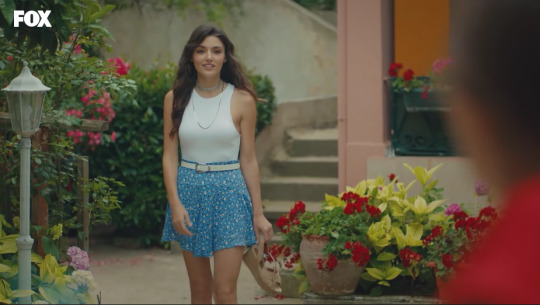
To be honest, this series of posts is mostly going to be a fashion roast. But DISCLAIMER! I really do love this show and Turkish TV in general, it’s just my preferred mode of media analysis is to pick things apart. 😂And I need everyone to know that I am very pro-women, and believe people should be able to dress how they want and not be judged for it or be looked down upon for it. But oh my god this wardrobe department/costumer needs to be STOPPED. I also have zero credentials to be talking about fashion, but will that stop me?
I’m going to make these posts assuming you’ve watched the show, and just comment on whatever comes up. There will be spoilers. Let’s go!
We start off with a voiceover from Eda Yıldız, an A+ romcom trope. (It wasn’t until my rewatch that I remembered that Eda used to do VOs at random intervals, and I’m kind of glad she stopped tbh.) She is a strong woman who wants to get her education and become a landscape architect/designer. She was all set to do that until- dun dun dun! - Serkan Bolat destroyed everything.
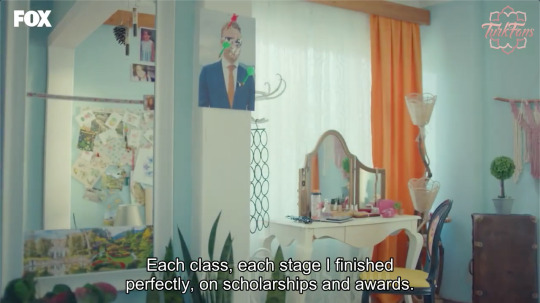
Check out that dart board of a man (and this is the only time we see that photo there). And these outfits are probably the most normal and reasonable clothes she wears in the show. She’s a beautiful young woman, who was a college student, and now works outdoors as a florist. 10/10 outfit.
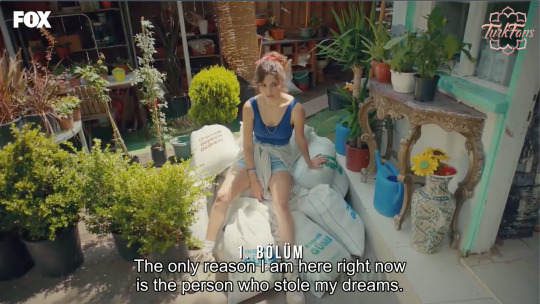
Of course that transitions us into an epic slomo of Serkan exiting his private jet. He of course begins to berate his assistant on the phone in a way a friend described as reminiscent of The Devil Wears Prada.
@teamnick‘s commentary back when she first started the show.
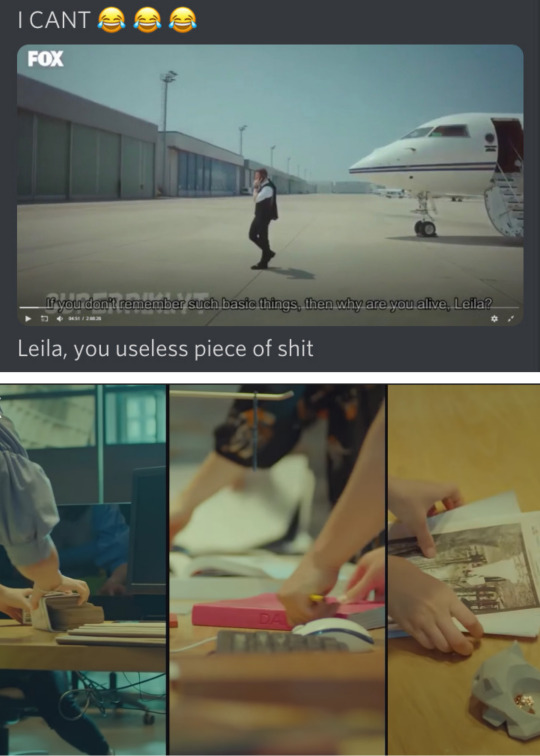
Serkan returns to his office for the first time in 2 months after working on business deals in London. Chaos ensues: Miranda Priestly is baaaaaaack.
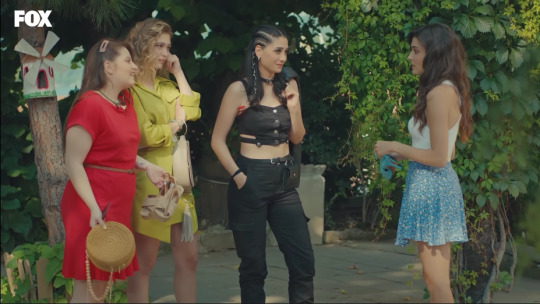
See... here we have some good fashion choices! We meet the girls for the first time, while they try to sneak off to their graduation without making Eda feel bad that she won’t be receiving her diploma. Melek “Melo” is dressed in a sweet dress with a bold, romantic color, which captures her personality perfectly. Ceren, the rich daughter from a family of lawyers, looks a bit more high-fashion. The dress is short but it has long sleeves and no cleavage so it works out to be chic and elegant. Fifi is unapologetically herself with her full-black, punk wardrobe. Eda is again dressed in a pretty, but casual outfit. Nicely put together for her lower-middle-class lifestyle and her job as a florist.
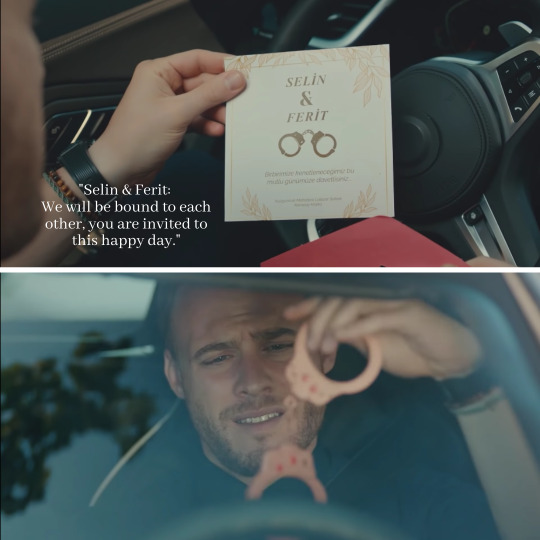
Enter: the plot device to get our protagonists together. Serkan’s face says it all.
We are then introduced to the main couple’s respective cars. Serkan has his 2020 BMW (though the show blocks out the copyrighted branding) while Eda’s beat up SUV is clearly unreliable. What’s that? Another plot device being introduced? I have no idea what you’re talking about.
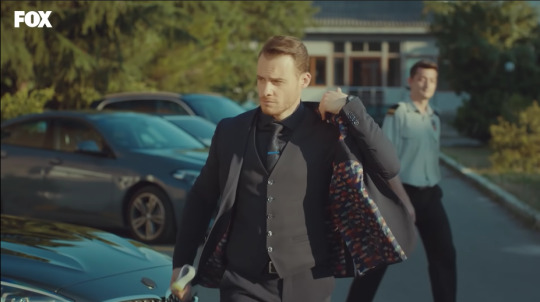
Also, I just noticed this, but for someone as uptight as Serkan, I’m surprised at how fun his suit jacket lining is. If I’m not mistaken the pattern is of a bunch of rainbow fish. #Snazzy, but they seem out of character?
Plot highlights:
Eda learns she can come back to school and finish her final year, but she’s lost her scholarship and will have to pay. She can’t.
Serkan gives his talk at the graduation (?)-- Is his talk just for architecture students? If so, why are Ceren, Fifi, and Melo there? We’ll never know. I know, I know... it’s all for the ~plot~
Eda calls Serkan out in front of everyone for taking away the scholarship that she earned from his company, Art Life. He is confused but unrepentant. She refuses to tell him her name.
She tries to deface his car with lipstick after keying the side (we never hear about the damage to his car after that). He catches her and wants to call the police, so she impulsively handcuffs them together with the plot devices from Selin’s wedding invitation sitting on his passenger seat.
They then have to go to Serkan’s urgent business meeting with an out-of-town client. Eda drives while they’re handcuffed together. Bickering ensues.
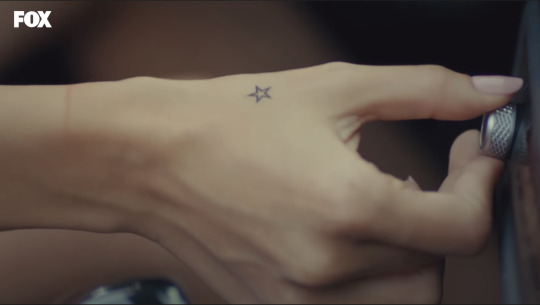
What is this? Foreshadowing? Symbolism?? Eda’s last name “Yıldız” is the Turkish word for “star” so... file that away for later.

One of my favorite parts about watching Turkish dramas is the experience of trying to decipher the fan translations. Add to the fact that Turkish only has 1 pronoun *chef’s kiss*
Eda refuses to take the elevator to the 15th floor (we’ll learn about her claustrophobia later). Serkan is equally as stubborn, saying she owes him for screwing up his day. But he has met his match in Eda with regards to stubbornness. They take the stairs.
More highlights:
First instance of fake dating - they need to hide the handcuffs from his client so Eda pretends she’s his girlfriend and a fellow investor.
The girls track Eda’s phone to the hotel and try to find her by asking around the premises.
Eda charms the client into selling his land to Serkan.
We learn that Serkan is allergic to strawberries and has a lot of health anxiety. He’s a very tightly wound person.
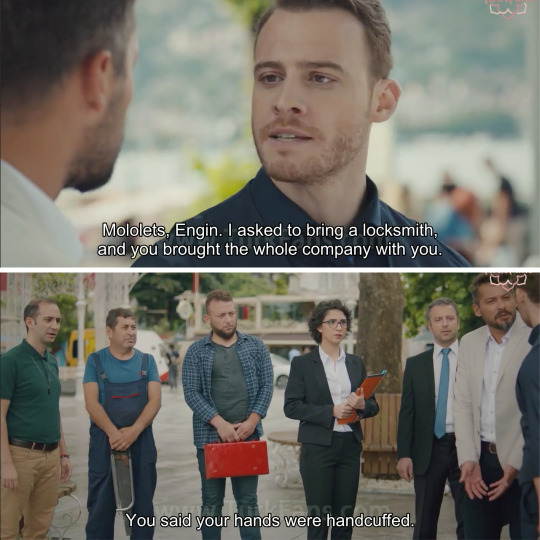
Serkan says “Mashallah,” translator hears 🤷🏻♀️🤷🏻♀️🤷🏻♀️
Engin brings way too many people to open the handcuffs and chaos ensues.
I feel like nothing can do justice to the comedy of 58:45 to 1:00:00 with Fifi using a bobby pin as a lock pick. The dramatic editing is 👌🏼
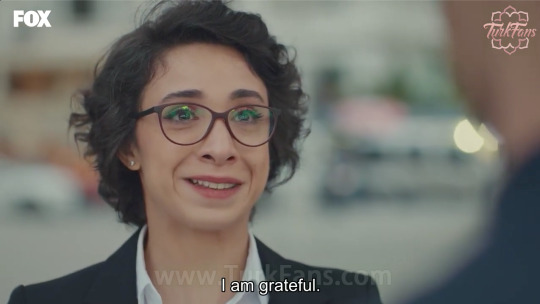
Leyla gets fired for somehow causing this drama??? And she is so happy to leave that stressful workplace omg, we don’t deserve her 🥺
Serkan and Eda go their separate ways, Eda prepared to never see her enemy again, but of course her phone and purse are still in his car so she has to go to his office at Art Life and confront him again.
Serkan has found out that Whoops, Art Life did cancel the study abroad scholarships to cut costs, but his CFO did it without telling him. And Serkan is pissed, but I think mainly about the fact that Eda did have some (SOME) grounds for yelling at him in public.
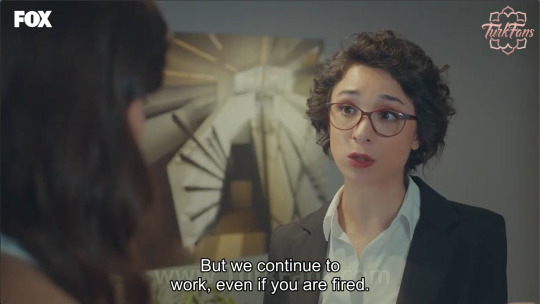
Leyla then explains the nonsensical reasoning behind her being fired-but-not-fired and still working. (Spoiler alert: she never goes anywhere and she is my favorite side character to this day).
Eda: “How can I piss Serkan off?” Leyla: “Find a mistake he’s made and he will fixate on it forever. But you won’t find anything.” Eda: “Hold my beer.”
Eda walks into Serkan’s office and his meeting. She gets her purse back and they fight about him not being willing to apologize for ruining her life and education. He refuses and says she owes him an apology for embarrassing him in public (no, dude).
He wants to give her back the scholarship and make it all go away but she rightly tells him that it won’t fix her broken pride from begging the company and her university for a second chance. But somehow her calling him a heartless “Robot” is what gets to him???? And he short-circuits. Eda walks out triumphant.
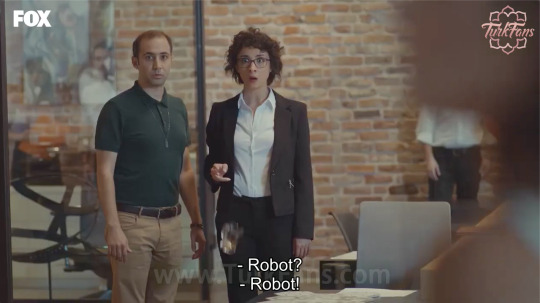
~dRaMa!~
MEANWHILE
Melo, as well as being a perfume sales girl, also works as a flight attendant and wants Eda to cover her shift (we’ll get into how that doesn’t make sense in a minute)
Eda says no, she’s going to meet her boyfriend, Cenk, who she hasn’t seen in months and has just returned from Italy.
Enter: Selin. Serkan’s ex who he dumped a while ago and is now engaged to the heir of a hotel empire. Serkan doesn’t like this. The two of them grew up together and are set to each inherit 50% of the holding company that Serkan’s father currently runs.
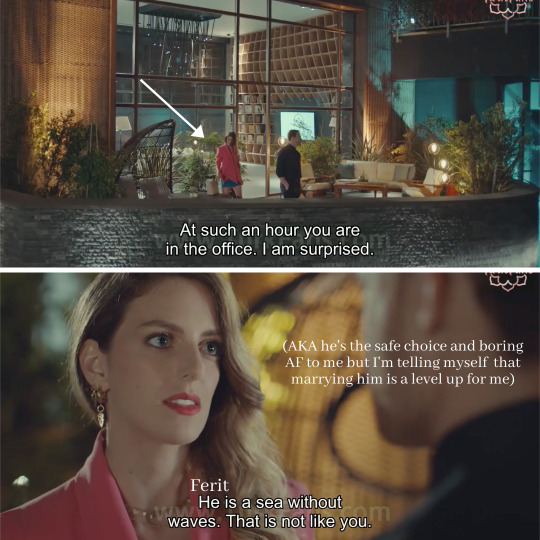
Right away Selin serves us with a gender reveal level color scheme. Personally not a fan. They confirm that Serkan is coming to her engagement party tomorrow.

Meanwhile Eda meets up with Cenk. Her outfit is still reasonable and cute for her character. He looks mildly like a hobo and doesn’t seem to have anything going for him (I know he’s a throwaway character but the two of them really don’t have anything in common).
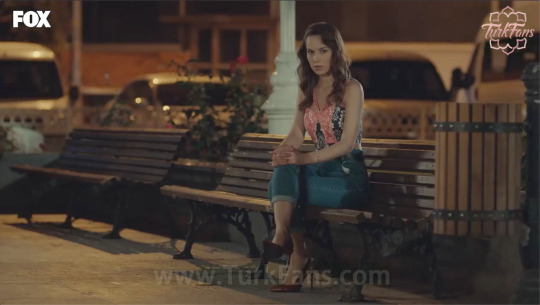
This creeper keeps staring at them, but Cenk tries to explain it away and says he’s busy and can’t meet her again until the day after tomorrow. Eda is disappointed but accepts this. Creeper girl remains and remains a red flag to viewers, but apparently not to Eda.
Cut to later that evening, and of course our broody main man enjoys astronomy in his free time (???) idk what he’s charting and to what purpose but okay?

Eda finds a mini first aid kit in her purse that Serkan put there before returning it. Queue montage of them treating their respective wrists for handcuff-related injuries. #couplegoals
Of course we also needed a sepia-toned flashback to earlier that day when the handcuffs contrived their faces to get too close together. #romance

Finallyyyyyyy it’s morning again and a new day.
Since Eda can’t see Cenk (good, he’s so boring), she agrees to fill in as a flight attendant for Melo, who’s side job is for a private plane company.
Now. This should not be a thing. Eda was in college to be a landscape architect and now works as a florist for her aunt... Where has she learned any relevant skills to work as a flight attendant?? Presumably nowhere. And I really don’t think a private plane company would be so easygoing about just having a random person fill in to cover for her friend?
But does this show care about that? What do you think...
Also, instead of the standard white shirt, black skirt uniform requirements, the girls decide that this skimpy dress and heels is fine? Hmmm

Also lol @ Melo for assuming that the client who wants jasmine tea and fruit salad is probably a woman. And her telling Eda that the PRIVATE JET COMPANY would in fact have its own tea was very random and unnecessary.
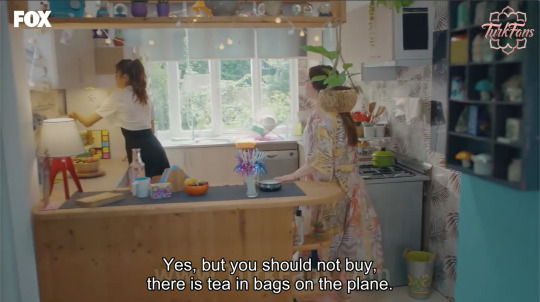
Back at the Bolat house compound, we meet the parents: Aydan and Alptekin. We’ll see them again later. Selin’s engagement party is today.

Meanwhile Eda is just.... being a flight attendant, I guess??? And who could possibly be the passenger she has to take care of? Take a wild guess. Of course it’s Serkan Bolat.

And of course that tiny dress (THAT ALSO HAS A LEG SLIT?? WHY?? I really don’t need to see her vagina) looks very practical and professional... not! (Hande Erçel is a gorgeous human, and the dress looks good on her, don’t get me wrong. BUT THIS IS SITUATIONALLY INCORRECT ATTIRE). Also him just folding his vest and then social distancing from it... K? 😂
Eda panics and doesn’t want Serkan to see her and runs away back to her seat pod thing - Serkan takes issue with his fruit salad for ~plot reasons~ (EDIT: I’ve been informed that it’s because there was a strawberry in his fruit salad and since he’s allergic, of course it needed to be fixed. Why doesn’t the plane have a note of that??) and comes back to find this mystery flight attendant.
Eda is very stressed out about this encounter and is also starting to have a panic attack because, surprise, she’s also claustrophobic.
After Serkan calms her down, they have a cute/civil conversation for the rest of the flight.
When they land, Eda realizes they’re on an island 2h45min away from Istanbul and she isn’t sure what to do with herself (How did she not already know where they were going, as the FLIGHT ATTENDANT??? So may red flags with this private jet company).
Serkan convinces Eda to come with him and she can hang out at the beach while he’s at Selin’s engagement party.
At the engagement party we finally meet Selin’s fiancé Ferit. He’s sweet and non-threatening and clearly insecure about Serkan being Selin’s ex.
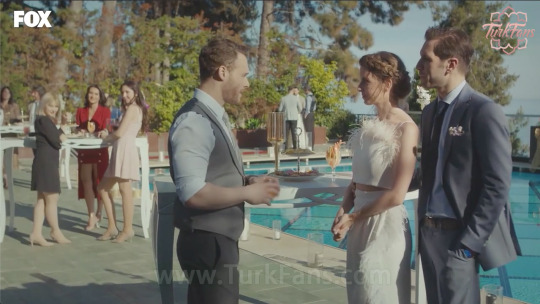
This dress/skirt outfit Selin is wearing isn’t terrible, but it doesn’t scream rich socialite to me. Anything with feathers seems... a bit tacky/too showy? Like someone pretending to be rich? Idk, this outfit isn’t one I’m going to really take a stand on.
Does this engagement party warrant being a 2h45 min flight away? No. They try to explain it away as the couple wanting to have something small and private, even though they also invite the press?? But okay whatever, as long as Serkan and Eda cross paths again, I suppose.
Kaan Karadağ has been mentioned a couple times in passing, but now we finally meet our “villain.” Ferit’s friend, and Serkan & Selin’s childhood acquaintance, who has it out for Serkan bc he somehow bankrupted Kaan’s dad? Idk and I don’t really care but tl;dr they’re enemies.
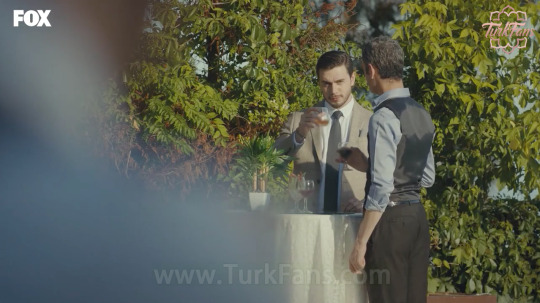
Another thing I love about Turkish dramas is the censoring. Like, they’ll allow alcohol to be on screen, but they won’t say the word and they’ll just blur out the bottle and any liquid that we’d assume is alcoholic 😂
In the evening, Serkan is tired and wants to leave and Ferit snidely jokes about how Serkan is too picky to have a fiancé of his own. Serkan flashes back to 1 entire day ago when he and Eda pretended to be dating at his business meeting, and says that actually he is engaged to someone and then peaces out.
Serkan finds Eda on the beach, and they are preparing to leave when a crowd of people (Selin, Ferit, and Kaan mainly), arrive to get a peek at Serkan’s new “fiancé.” Eda very reluctantly plays along (good thing she has that unnecessarily sexy “work” dress to help her look the part) and Serkan notices that for the first time ever, Selin is jealous of another woman. #drama
After they finally escape the crowd, Serkan makes an annoyed Eda an offer: Pretend to be his fiancé for the 2 months leading up to Selin’s wedding so he can get them to break up and prevent Ferit marrying into the company. In return, he will pay all the fees to help her complete her last year of studies in Italy.
Eda refuses, stating that she doesn’t want anything from him, and besides she has a boyfriend (Sure Jan; Cenk is such a joke). They have it out and then fly back to Istanbul. But of course the gossips at the engagement have spread the news of Serkan’s new woman so the paparazzi corner them at the airport when they land.
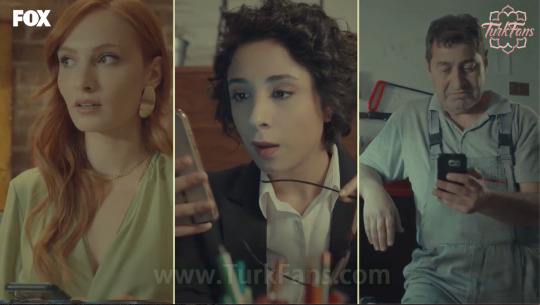
So glad that we got to see this random mechanic find out the news (???)
They escape the cameras and Serkan takes her home, saying that Art Life has a press conference tomorrow, and she should come so he can save face and tell everyone that she was his assistant accompanying him for work to the party. Eda agrees.
It should also be mentioned that Serkan still doesn’t know her name at this point?? She refused to tell him and Engin still hasn’t sent him the names of the scholarship candidates so it’s a bit miraculous that their relationship was at all believable.
The next day, Cenk wants to meet but Eda has to go to the press conference. The girls come too for whatever reason, and Melo is convinced that Cenk wants to propose. Eda just lets that fantasy take hold (why tho?), and Cenk shows up unexpectedly right before the press conference and takes Eda into the nearby hotel’s cafe so they can talk.
Eda seems ready for a proposal (they haven’t seen each other or really communicated in months??) but Cenk wants to break up. Eda is shocked (???) but then Cenk mentions that he has a new girlfriend from Italy that he adores, and oh by the way, it’s the creepy girl from the other night who also happens to be here right now?
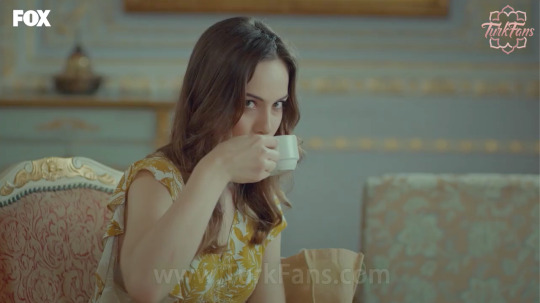
Okay fine, I guess??? Cenk: “She’s doesn’t speak Turkish” Girlfriend: *clearly a Turkish actress*
Eda is upset that he brought his jealous girlfriend with him to break up with her and says something about how actually, she’s seeing Serkan Bolat now (maybe it’s just me being someone who doesn’t follow tabloids, but are business people really that popular in every day society where everyone knows who they are?). Cenk laughs at Eda, saying that everyone wants to be with Serkan Bolat, and that she’s bluffing.
Eda makes an impulsive decision, and walks away, over to where Serkan has started the press conference. And seals their fate as fake dating in the public eye.
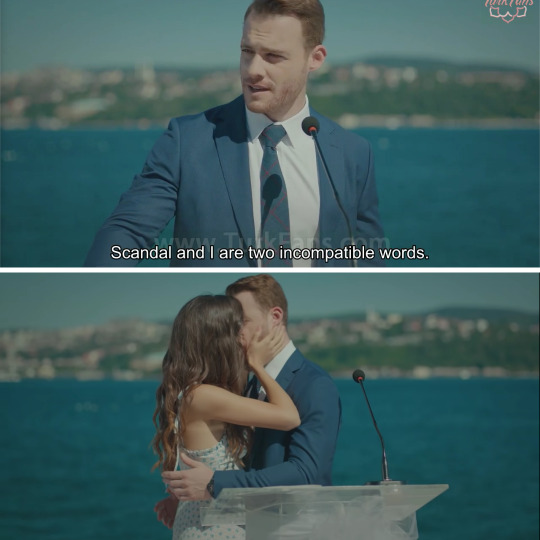
Queue confetti. No really.
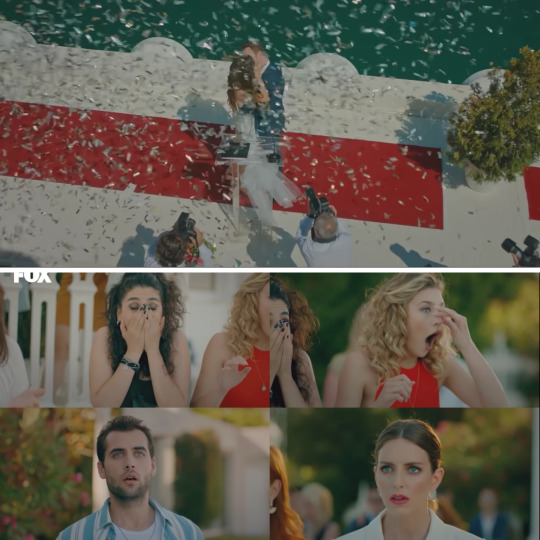
And there we have it. That’s the episode!
In all seriousness, it’s a pretty great pilot, especially for a romcom. It hits all the right beats, includes enough tropes, and tells us a lot about what we should expect in the episodes going forward. And no matter how much I make fun of it, I really do enjoy this show! It’s been such a nice distraction from Current Events. I’ve spent a lot of time watching these episodes just saying “oh my god” out loud to myself as I watch all of the cute/romantic gestures that give me a lot of second hand embarrassment (I forget that PDA makes me kinda uncomfortable 😂).
There wasn��t actually that much terrible fashion in this episode, which I didn’t notice until my rewatch. If I continue with this series of posts, I’m hoping they’ll end up being less plot-centric, and more about the situationally inappropriate outfits and strange subtitling choices.
See you next time?
#was this a good use of my time? you decide 😂#should I do all the epiosdes? I want to get to the really bad outfits#episodes#sçk recap#sen çal kapımı#mwtd#thescorpioracer#sck#sçk#sen cal kapimi#sen çal kapimi#eda yıldız#serkan bolat#kerem bürsin#hande erçel#edser#1. bölüm#Maya watches Turkish dramas#long post#turkish drama#turkish dizi#dizi
38 notes
·
View notes
Text
Folds in Paper (Chapter 6: You Try to Cut Her Wires)[Folds in Time Universe]
Fandom: Sanders Sides
Relationships: Janus/Patton, Remus & Roman, eventual Logan/Virgil (maybe more)
Characters:
Main: Janus, Patton, Remus
Appear: Remy, Emile, Virgil, Logan, Roman
Summary: Janus, a disillusioned senior agent working for the Time Preservation Initiative, struggles to find meaning in a world where time travel could change everything about your life’s history in less than a moment. When time distortions start popping up, threatening the timeline and the fabric of reality as he knows it, it becomes a race against the clock to fix the damage before everything unravels. And the problem with time travel… you never how long you have before the clock strikes 12 and your time is up.
With a partner who has more mysteries in his past than Janus had anticipated and an enigmatic free agent time traveler mucking about time always with a clever pun or a time appropriate pet name on his lips, Janus will need to figure out what went wrong with time, and more importantly, how to fix it.
Chapter Summary:
You try to cut her wires but you're way too late.
-from the song “Time Bomb” by Iration
Notes: Time travel AU, mystery, enemies to lovers, alcohol
This is a fic I’ve been writing on study breaks that you have probably all already seen at this point. I’ve slightly edited it for wording and grammar, but not for content from my previous posts. Feel free to send in asks to direct it because I’m not 100% sure where this is going and you can help decide if you feel so inclined! You can see the process I went through to build this at this link.
I also have a playlist on youtube (because Spotify didn’t have one of the songs I wanted).
AO3 Part 1 Part 2 Part 3 Part 4 Part 5
“Really, Khalid,” Janus said, storming into his boss’s office before even sitting down at his desk that morning. “A yellow?” It had been about a week since the 1920s incident, and his incident report had finally been cleared. Sure, it wasn’t a red or a black and he wasn’t facing any reprimand, but it should have been a green.
She looked up at him, clearly unconcerned. “There was an incident,” she said. “You handled it well, but there was one. Therefore, yellow.”
“It wasn’t a time period incident! It was a rouge time traveler.”
“Janus, you helped me make these rules,” she said impatiently.
“Which is why I know this is bullshit,” he snapped.
She rolled her eyes. “If it was anyone else, you would agree with me. While you didn’t go against protocol and had no time related incidents, the fact of the matter is, you were still distracted by this ‘rouge time traveler,’ didn’t complete your mission, and were arrested.”
“He was good,” Janus said. “You can’t fault me for that. He also could be dangerous and you’re busy handing out yellows instead of working to track him down.”
She raised an eyebrow. “We are working on tracking him down,” she said. “We have done an analysis on the mask and found fibers dating to the 2010s and some DNA. Though it isn’t exactly a high priority.”
“We have no idea who he is or what he’s planning to do. Why is that not a high priority?”
“At the moment?” she asked. “Because we have reports of a time bomb being activated.”
“What?” Janus asked straightening up. “When?”
“New Years Eve going into the year 3,000 in Brazil,” she said. “Which you’d know about if you’d bothered to check your integration port this morning before storming into my office.”
“It’s my mission?” Janus asked.
“The incident investigation is over and your active again despite the dreaded yellow,” she said, clearly making fun of him a bit. “So, yes, and it’s a high priority mission, so it is our mission. I’m leading it.”
“Who all is going?” he asked.
“Other than the two of us, Remus, Lena, and Fred,” she told him. “We leave in three hours, so, you might want to run off to Rhi before Fred gets to her and ties her up for an hour on details.”
Janus nodded and got to his feet. He turned back at the door. “I still don’t deserve the yellow,” he hissed.
She waved him off. “I’ll see you in a few hours, Picani.”
He ground his teeth a bit about the dismissal of his worries, but his resentment was slightly soothed by the fact that she’d assigned him to go on such a high priority mission and with only other senior agents.
He took the advice and grabbed Remus from the office, noting Lena hadn’t been able to wrangle Fred yet as she was still at her desk, and they both headed off to see Rhi.
A few hours later, they were all in decontamination together, decked out in truly god-awful costumes. The turn of the third millennia had been a wild event, and the best way to fit in was to look like you’d grabbed something from every century in recorded human history, dyed it in neon paint, and rolled around in a vat of glitter.
Remus had opted to stick his head in a vat of thick glow in the dark green paint that costuming had offered them. It was so caked on that Janus couldn’t even recognize him on sight, and it wasn’t even going to be slightly disruptive to their covertness. In fact, costuming had frowned when Janus had insisted he not get his hair dyed and instead wore a bowler hat. They had required him to have flowers made out of glitter on it.
There were five people waiting for them when they landed 6 hours before the turn of the millennia. Three were touchdown agents, including Remy, and two were on location tech support. Usually it would be overkill to have that many people there just for support even with five agents in the field, but today the TPI needed to be cautious because they were planning on instituting a time lock.
Time bombs were dangerous things that would ripple through time if not contained. They were nests of anywhere between 10 and 50 bombs that were set off by one core explosion. This core explosion would punch through space-time and spew the multitude of bombs across different places and times. Beyond just causing huge explosions where they landed, they would also pose a danger to any time travelers that accidently traveled through them and they could cause disruptions in the timelines around the source and where each one ended up. Once they went off in their source time, there was very little one could do to stop the damage. Thus, the time lock. The time lock would make sure that even if it did end up going off (killing everyone in its reach), the damage wouldn’t extend outside of the city and, more importantly, the year it was planted.
Janus had only been in two time locks before, and he was one of the most senior agents in the TPI, outranked only by the founder: Lia Khalid. Time locks were designed to keep all time linear in a certain fixed time and geographical area as well as prevent any time travel in and out. Once it was engaged, all forms of time travel would not work for the duration, bar the pin device. Khalid was already switching out her regular timepiece with the slightly bigger one that was designed to support the time lock.
There was a failsafe back at the TPI that could be engaged in an emergency, which was why tech support was here, but other than that, the only thing that could break the time lock was that timepiece, and said timepiece would break the moment the time lock ended, making it impossible to return to the inside of the timelock.
As soon as it was on Khalid’s wrist, she looked up at them all. “Our information says the time bomb was planted in the costume of one of the ‘Millennium Birds’ who are the organizers of the different events,” she said. Janus had seen a photo of the identical costumes in the mission details. They were all robe like garments with giant fans of feathers coming from the neck that coalesced in a peak a foot above their head to hold a fake bird egg. At least they’d be easy to find. “There are 25 of them throughout the city. We need to find each of them. So we don’t double count, you’ll need to subtly,” her eyes touched on Remus, “scan each one you find for the bomb and tag them with a tracker if it’s not on them. You can view the already tagged ones, as well as the rest of us on your timepiece even once the time lock is engaged. When you find the bomb, call it in.”
They all nodded, and Khalid looked over at one of the techies. She nodded at her and then the techie flipped a couple of switches. “Three, two, one,” the techie said. There was a slight shift in the air that most people would disregard, but Janus, as a seasoned time traveler, could feel the change even before his wrist buzzed. He glanced at his timepiece to see it had a big red ‘X’ across its display. He tapped it and was still able to bring up the map of the city with 10 green dots on it all clustered together in their current location.
After that, he tested the scanner on his timepiece that he would use to search for the bomb, just to make sure the time lock hadn’t messed anything up with his equipment. He glanced up to see everyone else was doing the same.
“Keep in contact,” Khalid said before everyone split up. Janus and Remus started by going North while Fredrick and Darlene were to go South. Khalid was a floater who would tag any Birds she saw but was mostly there for backup and orders.
Janus and Remus stepped into the chaos of New Years Eve before the turn of the third millennia. The streets were already swamped with people and it would only be getting worse the later it got.
“Where should we start?” Remus asked.
“Let’s go all the way North to the games area,” Janus said. “We can work our way back here.”
“Okay!” Remus said. “I wonder if they have those fun little genetically modified goldfish as prizes. I’ve always wanted to eat one and see if I end up getting whatever design was on the fish on my body.”
Janus gave him a disgusted look.
“What?! People eat fish all the time!”
Janus shook his head. “We’re not playing the games anyway. We have work to do. Important work.”
“Boo,” Remus replied. Janus chose to ignore him.
A few minutes later, he spotted one of the Millenia Birds letting people into the gaming area.
They walked over towards the entrance. Janus got in range first and moved to subtly scan the Millenia Bird, Remus doing the same the next moment. After a second, Janus’s timepiece buzzed and lit up red, meaning the bomb was within range. “Well, that was easy,” he said. “It was on the first one we found.”
“Uh…” Remus said. “Jan.” When Janus looked, he was holding up his wrist to show his green lit time piece.
“What?” Janus asked. He quickly moved to rescan the Millenia Bird, and his timepiece came up green as well. Which, meant the bomb was not in range, even though the Millenia Bird had not moved. “But…” He and Remus’s eyes met, and they quickly both started turning in a circle to look at the crowd around him. No one looked like they’d just stolen a time bomb off the Millennial Bird, but then Janus’s eyes caught on a man.
He blended in perfectly to his surroundings. He was wearing the disgusting garb of the times, a large light blue piece that bubbled near his hips, and he had most of his skin covered in rainbow neon paints. Yet, something about him, the curl of his hair or the way he moved, drew Janus’s eyes to him. He recognized the man immediately even in a completely different dressing style. Yet, what cinched it was the moment Janus’s eyes met his, and they seemed to sparkle slightly in the afternoon sun. The next moment, the person Janus knew as Pat, turned to disappear into the crowd.
Want to read more? Click below!
AO3 Part 7 Part 8 Part 9
#sanders sides#janus sanders#patton sanders#remus sanders#moceit#time travel#adriana writes#folds in paper#folds in time universe#bomb mentioned#logan sanders#virgil sanders#analogical#roman sanders#creativitwins
29 notes
·
View notes
Text
My Thoughts on Gotham
My mom and I finished watching Gotham on December 29th, and this analysis has been sitting in google docs since then. Some of this is a bit incoherent, some of it I wrote as I was watching, and some of it I wrote after finishing the entire show. So here it is. 2,000 words or so of rambling about Gotham.
My thoughts on the show as a whole: Gotham changed my opinion on a lot of Batman’s villains. I used to be indifferent towards Penguin, now I love him. I used to hate Firefly, now I love her. While there were one or two decisions that I disagreed with, the portrayal of these characters was satisfying and the tone of the show as a whole was refreshing. The writing was good for the most part, however there are issues with sexism and homophobia that I personally noticed.
And now I’m going season by season cause I’m a nerd.
Season One
Season one is a bit of a mixed bag for me. It seemed to me that the show writers and the younger actors were still trying to find their footing and decide what kind of world their Gotham was. Some episodes are slow, but overall it’s intriguing and I was invested after a couple of episodes.
The pilot has a lot of moving parts and it still works. They did a good job of intertwining all of these characters before starting them all on their own paths.
I can’t imagine anyone else playing these roles. I am really happy with the casting choices for this show. Jim Gordon, Harvey Bullock, and Bruce Wayne especially.
Fish Mooney is an interesting but welcome edition! To be honest, the first time my mom and I tried to watch Gotham, we hated her. The second time around, however, I LOVED her and her role in the rise of Penguin.
Having Edward Nygma start at the GCPD was a really cool idea! I think they executed his descent into madness perfectly. I wanted Ed to prevail and to be a goodman just as much as I wanted to see the Riddler emerge.
Speaking of the GCPD, the corruption and the conflict within the precinct is very believable and compelling. It’s easy to believe that Jim Gordon is a young and optimistic detective who believes wholeheartedly in doing good. I also appreciate the fact that Jim Gordon doesn’t lose that drive for good throughout the show. I also don’t find it too cheesy, even if it’s a common trope.
The Batman universe is huge so I was expecting references and easter eggs at every turn, and I was half right. There's plenty of references and cameos but they work and they aren’t essential to the plot which helps casual fans keep up with the story.
A lot of seeds are planted during this first season, and it’s rewarding to see them pay off. I don’t feel as if the first season suffers from the thing that a lot of movies do where they are clearly trailers for the next part in the franchise.
I think my favorite episode of this season is episode 20 “Under the Knife.” The stakes are high and the story line with the Ogre is definitely unexpected and horrifying but in the best way. Also Ed kills Dougherty and it’s very satisfying.
Season Two
Rise/Wrath of the Villains!
Theo Galavan and Hugo Strange were the big bads of this season and I think they were written and acted very well.
Something I’ve noticed about some of the villains on this show and their interactions with children and Bruce in particular is that they’re... unsettling. I suppose that’s intentional and I definitely think it makes some of the villains more intimidating, but it’s really creepy. There are a lot of adults that are preying on Bruce’s innocence in this show.
Theo Galavan was not my favorite. He was intimidating for a bit, but I kinda grew bored of him. I did enjoy the nod to Azrael.
Hugo Strange! I was kinda indifferent to him when playing Arkham City but I enjoy him in this show! Loved when he showed up again in subsequent seasons and you immediately knew some Fucked Shit was happening.
So Mr. Freeze. I’m not too sure how I feel about Gotham’s take on this story. The casting is solid, but killing Nora? Not the move. Actually very angry about that to be honest. The Mr. Freeze episode could’ve been so much more compelling and emotional but instead it was a way to move Lee and Jim’s relationship forward :(
They managed to make Firefly not annoying, but I only found Firefly annoying before because of that stupid boss fight in Arkham Origins. But I liked Bridget.
Penguin and Nygma’s relationship is very fun in this season! More on them later, but at least in season two it’s very enjoyable to watch them learn to trust each other. My mom and I adored their story line.
I LOVE Nygma’s character arc in this season. His interactions with Gordon are some of my favorite bits from this season. They are very rewatchable and I find their relationship to be one of the more intriguing ones in the show.
Overall season 2 was decent. Some of the villains were forgettable, but the relationship arcs and character arcs that were compelling kept me interested.
Episode 15, Mad Grey Dawn, was one of my favorites this season. Seeing the Nygma v Gordon thing play out was so so so fun. I really loved being able to follow Nygma’s logic and feel Gordon’s frustration at being framed.
Season Three
Mad City/Heroes Rise!
There’s A LOT I have to say about season 3. I liked it. There’s a couple of big issues I have with season 3, but overall it was compelling and I enjoyed it.
While I’m not usually one for the “this character has a darkness inside of them” trope, I really didn’t mind it with Gordon. I thought it was believable and interesting enough to be engaging. bounty hunter Gordon was pretty fun, too. And hot. Anyway.
The Mad Hatter v Jim Gordon stuff is intense. Episode 6 where Gordon is forced to choose between Valerie and Lee is where the “dark side” trope lost me a little but I do like that they make a point to have Gordon always make his way back to the light. Valerie’s exit felt very rushed and sudden? I don’t know if the actress was written off for some reason, but it felt very weird.
So. Penguin and Nygma. I don’t know if I would necessarily call it queer-baiting, but it definitely doesn’t sit right with me. Here’s the thing about Gotham’s queer representation: it’s not good, but it’s not bad. There is 100% an issue with making all of your queer characters villains. And there’s a HUGE issue with having Barbara��s attraction to women only be present when she’s a) acting as an antagonist to Gordon’s work at the GCPD (Montoya in season one) or b) on the side of the antagonist and framed as crazy (Tabitha in season two). Also, notice how in season five she’s “sane” when she’s with Gordon. It’s homophobia luv.
However, in the case of Penguin and Nygma, the added layer of Penguin’s love for Nygma makes their arc a little more interesting and compelling (there’s still an issue with queer love being framed as toxic and obsessive in this show, but if I don’t stop talking about that this post will be miles long).
The Ivy thing is certainly a new plot device, but I don’t hate it. Took a bit to get used to, but older Ivy makes sense and to be honest, I wasn’t a huge fan of child Ivy. Not that her character was bad, but I personally found her a tad annoying.
SEASON 3 EPISODE 14. THE GENTLE ART OF MAKING ENEMIES. I HAVE A LOT TO SAY ABOUT THIS. Bruce’s character development in this episode made me extremely happy. I haven’t talked a lot about Jerome-Joker yet, but I really like him. Joker is one of those characters you can take a lot of liberties with and it can either really work or really suck (looking at you Jared Leto). Gotham’s version of Joker, while a bit rushed, is a good fucking Joker.
The reason why I like s3e14 so much is THIS is what the Joker vs Batman relationship is about. This is why they are perfect foils. Batman always has a reason, a method. Motivation and a cause. He believes in Gotham and he believes that EVERYONE has the capacity for good. Joker does things just for the hell of it (i.e. kidnapping Bruce). His point is anarchy and chaos. His point is that everyone has darkness and that they are “one bad day” away from giving into that darkness (subtle nods to The Killing Joke, very nice). This is illustrated SO beautifully in this episode. However, I do see an issue down the line of Joker knowing who Batman is instantly, but I digress.
The birth of Riddler! The development of Penguin and Riddler’s animosity! mwah!
Also. Bruce standing above Gotham in an early version of the suit. There’s no ears or cape but my mom and I were VERY excited. I felt so giddy.
Bruce’s vow not to kill was beautifully framed, props to the DP on that one. It felt nice to hear a live action version of Bruce Wayne say that. (Note from the future: yes he breaks it. Sorta. I’m mad about it, but I explain my feelings in depth later).
Season Four
A Dark Knight!
Alright. Season 4. To be honest, it took me a while to warm up to this one.
Scarecrow. Love his costume. Love his escape. Scarecrow is one of my favorites because he’s creepy and cool and terrifying. Well done. The episode where Jim goes after him is really brutal. He goes there alone, not even Harvey by his side, and he is forced to stare his biggest fear in the face. I loved it!
The Pax Penguina. I’m easily won over by references to old literature and history. This show has made me actually like Penguin. I used to find him annoying and didn’t understand why he was people’s favorite, but this show has proved him to be a competent and cunning villain. I love to hate him. It’s fun seeing him at the top of Gotham.
Riddler’s escape and Nygma’s return. His friendship with Lee and Grundy (Grundy!!). Ed and Lee was certainly an interesting choice. I didn’t hate it, it just seemed really odd. I enjoyed Lee’s rise to power though!
Sofia Falcone. Not really a fan tbh. Didn’t trust her from the start and it was SO satisfying to see her get shot in the head. Talk about a ruthless mastermind. To be fair, I did love to hate her in the beginning, but then she kinda got on my nerves? The actress that played her was really good though!
Captain James Gordon. Yessir. What a legend. One step closer to Commissioner. But also ouchie he had to go behind Harvey’s back. That subplot hurt so good.
Professor Pyg is. A lot. Gotham is a mature show, but it’s hard to like Pyg even as a villain. He’s unsettling and his episodes are a bit too much. I tolerated him but it just got to be gratuitous. I will say that I am relieved that they weren’t heavy handed on the cross-dressing thing. Would prefer not to see that played for a joke anymore, and this show does not need to vilify queerness more than it has.
Jerome and Jeremiah! ahhhhh!!! What wonderful interpretations of the Joker! Jerome was great, but I think I’m partial to Jeremiah. Maybe because his costume looks so much like the Joker from the animated series and Mark Hamill will always be my Joker. Either way, I LOVED their story line in season 4.
Kinda love Barbara being involved in the League. Very sexy of her. Also very sexy of her to not be dead.
Alright. Here we go. Ra’s Al Ghul and Bruce Wayne. I have mixed feelings about this. So Bruce kills. Technically he’s not Batman yet, and obviously Ra’s didn’t stay dead, but he already took the oath. I have a hard time staying with any adaptation that makes their Batman a killer, but this one wasn’t awful? And then technically Barbara uses Bruce’s hands to kill Ra’s in the finale. I’m upset that they went with a “what if Batman kills” story line in the first place, but the resolution wasn’t too terrible.
Those last three episodes of season 4. Wow. My mom and I couldn’t stop watching. The nods to The Killing Joke were cool but not too on the nose. The stakes felt high and I was so deeply invested because this story line in particular was very well crafted and planned out and it definitely shows. There’s so many loose ends at this finale, and somehow it works and you still have hope. But holy shit, those bridges coming down, the utter panic and confusion as you’re wondering “is X person okay? what happened to X?” wonderful, chefs kiss.
Season Five
Legend of the Dark Knight!
Oh gosh. I have so much I want to say, but I don’t know how to put it into words. I loved this season. I loved the post apocalyptic vibes of Gotham. Loved the rise of the villains into the people who will one day face Batman. Loved Gordon’s leadership and rise to Commissioner. There’s a few things I have issues with this season, but I’m just so in love with that finale. What a beautiful send off.
I loved how the finale was crafted, how we didn’t see the full Batman suit till the end. I did, in fact, cry when that thing was revealed. The score was beautiful. It felt so much like an episode of The Animated Series, yet so unlike any other piece of Batman media. It was so refreshing to have everything wrapped up nicely, so refreshing to have hope and satisfaction in a finale.
Overall, this version of Gotham City feels like a living, breathing thing that is lived in and flawed. It is wonderful. The set designers did wonderfully and it feels so timeless in the way that the Animated Series did as well. I think that’s part of the reason why I loved this show so much. It made me feel the same way that the Animated Series did.
I know I’ve missed a lot of details and plot lines, so if for some reason you are interested in my thoughts on a particular thing in this show, my inbox is open!!
9 notes
·
View notes